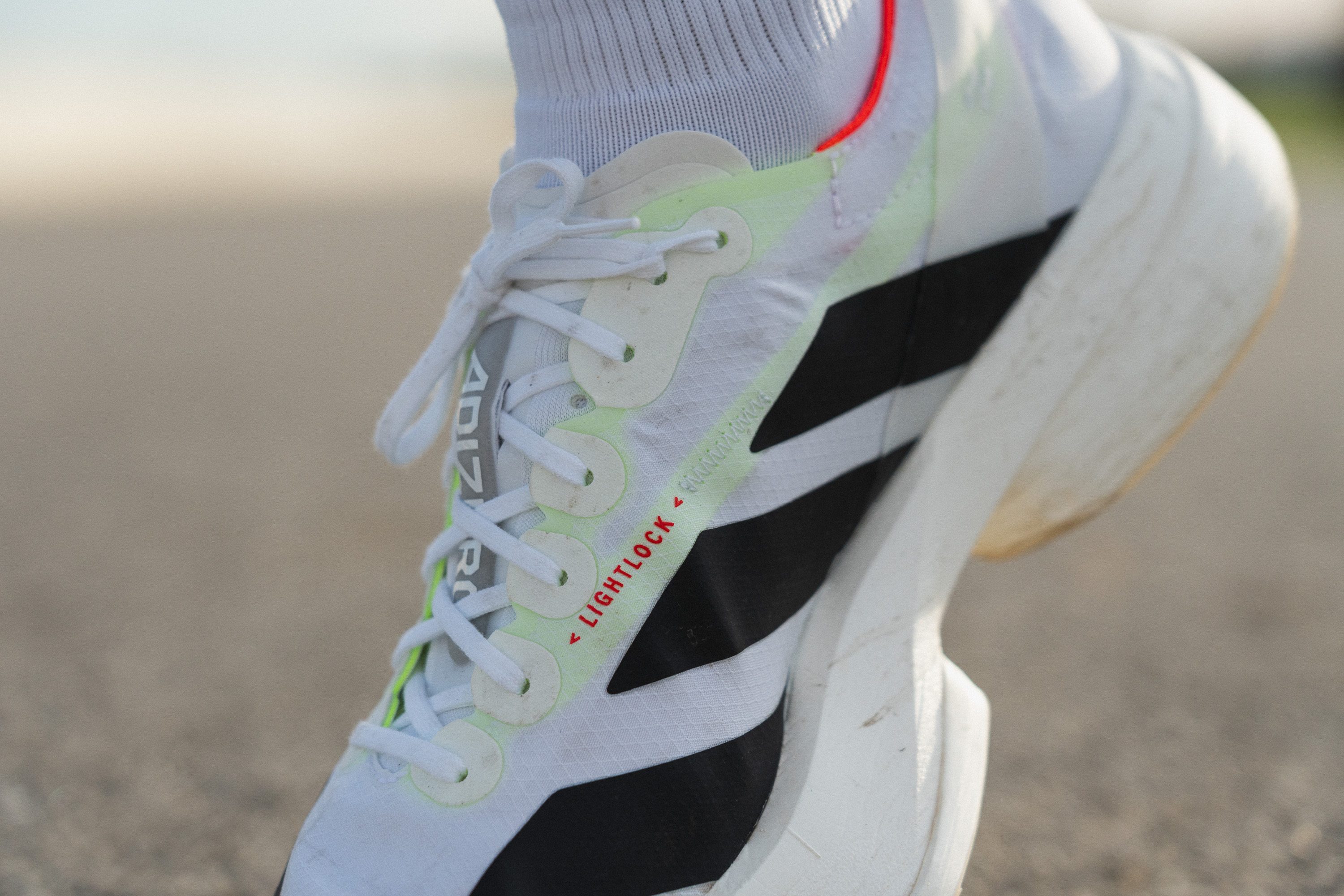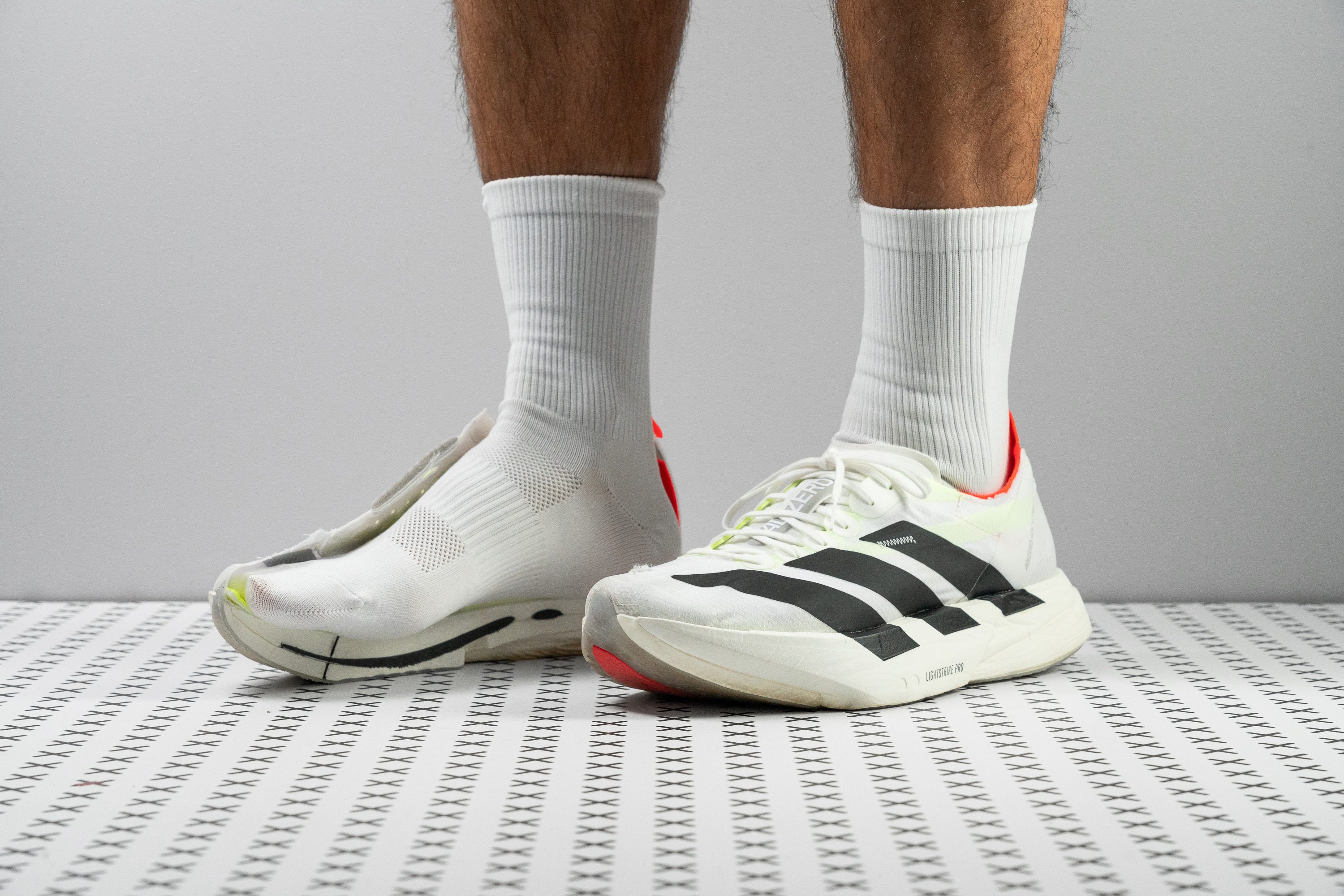Nuestra conclusión
Pros
- Espuma Lightstrike Pro más blanda y con más rebote
- Mantienen el mismo precio
- Se acabó el deslizamiento del talón
- Versátiles: desde distancias de 5K a maratones
- Suela exterior duradera y con muy buen agarre
- Ideales para los corredores de metatarsos y de mediopié
- Mejoradas para los corredores más rápidos
- Lengüeta reforzada y cómoda
- Más ligeras que las Adios Pro 3
Contras
- Inestables para cualquier talonador
- Parte delantera estrecha
- Upper poco transpirable
- La mediasuela pierde rebote más rápido que la de las AP3
Veredicto de los usuarios
- Top 2% entre Zapatillas de running para asfalto
- Top 2% entre zapatillas de running neutras
- Top 14% más vendidas zapatillas de running
Comparativa
Las zapatillas de running más parecidas
+ + Añadir unas zapatillas | |||||
|---|---|---|---|---|---|
| Puntuación global | 93 Excelentes | 88 Notables | 90 Excelentes | 88 Notables | |
| Precio | 250 € | 250 € | 230 € | 310 € | |
| Pace | Competición | Competición | CompeticiónTempo / series | Competición | |
| Absorción de impactos | Alta | Alta | Alta | Alta | |
| Retorno de energía | Alto | Alto | Alto | Alto | |
| Tracción | Alta | Alta | Alta | Moderada | |
| Arch support | Neutral | Neutral | Neutral | Neutral | |
| Peso laboratorio Peso marca | 7.1 oz / 200g 7.1 oz / 201g | 7.8 oz / 220g 7.7 oz / 218g | 7.2 oz / 204g 7.4 oz / 209g | 7.1 oz / 201g 7 oz / 198g | |
| Lightweight | ✓ | ✓ | ✓ | ✓ | |
| Drop laboratorio Drop marca | 8.1 mm 6.0 mm | 9.5 mm 8.0 mm | 10.6 mm 8.0 mm | 8.5 mm 8.0 mm | |
| Técnica de carrera | TalónMedio/antepié | TalónMedio/antepié | Talón | TalónMedio/antepié | |
| Talla | Tallan un poquito pequeño | Tallan bien | Tallan bien | Tallan un poquito pequeño | |
| Rigidez de la mediasuela | Blanda | Equilibrada | Blanda | Blanda | |
| Diferencia de la rigidez de la mediasuela en frío | Pequeña | Pequeña | Normal | Pequeña | |
| Durabilidad de la parte delantera | Mala | Buena | Mala | Mala | |
| Durabilidad del acolchado del talón | Alta | Alta | Alta | Alta | |
| Durabilidad de la suela exterior | Buena | Buena | Decente | Mala | |
| Transpirabilidad | Baja | Alta | Media | Alta | |
| Anchura / ajuste | Media | Media | Media | Media | |
| Anchura de la parte delantera | Estrecha | Media | Estrecha | Media | |
| Flexibilidad | Rígida | Rígida | Rígida | Rígida | |
| Rigidez torsional | Rígidas | Rígidas | Rígidas | Rígidas | |
| Rigidez del contrafuerte del talón | Flexible | Flexible | Flexible | Flexible | |
| Placa | Placa de carbono | Placa de carbono | Placa de carbono | Placa de carbono | |
| Rocker | ✓ | ✓ | ✓ | ✓ | |
| Talón laboratorio Talón marca | 36.6 mm 39.0 mm | 38.1 mm 40.0 mm | 39.2 mm 40.0 mm | 38.1 mm 40.0 mm | |
| Antepié laboratorio Antepié marca | 28.5 mm 33.0 mm | 28.6 mm 32.0 mm | 28.6 mm 32.0 mm | 29.6 mm 32.0 mm | |
| Anchuras disponibles | EstándarAncho | Estándar | Estándar | Estándar | |
| Orthotic friendly | ✓ | ✓ | ✓ | ✗ | |
| Estación | Todas las estaciones | VeranoTodas las estaciones | Todas las estaciones | VeranoTodas las estaciones | |
| Removable insole | ✓ | ✓ | ✓ | ✗ | |
| Clasificación | #4 Top 2% | #139 Top 37% | #39 Top 11% | #129 Top 34% | |
| Popularidad | #53 Top 14% | #42 Top 11% | #44 Top 12% | #23 Top 7% |
Quién debería comprárselas
Según nuestros análisis, las queridísimas Adios Pro 4 son una opción ideal para:
- Los corredores a los que las Adios Pro 3 les parecieron demasiado firmes, a los que no les gustó su upper, o que tuvieron problemas con el cierre del talón.
- Cualquiera que necesite unas superzapatillas reactivas y con un buen agarre que destaquen en carreras de cualquier distancia, desde 5 km hasta maratones.
- Los corredores de mediopié y de antepié que estén buscando unas superzapatillas mullidas.
- Los corredores que prefieren las zapatillas de competición flexibles en vez de los modelos ultrarrígidos.
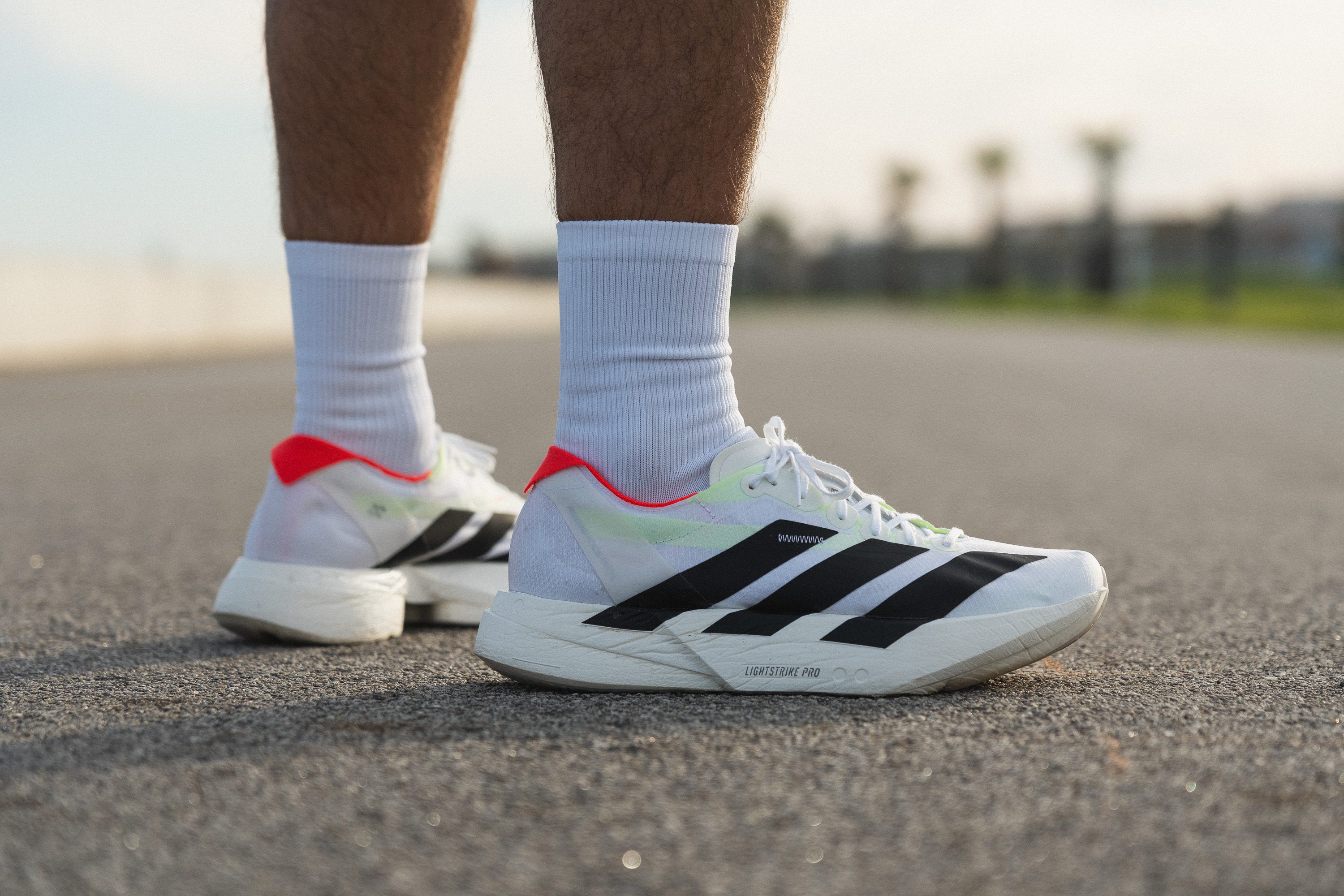
Quién NO debería comprárselas
Las Adios Pro 4 vienen con actualizaciones interesantes, pero creemos que también tienen algún punto flojo que es importante tener en cuenta. En cuanto al ajuste, por ejemplo, ahora tienen una parte delantera que se estrecha más hacia la punta, sacrificando la comodidad para pies anchos de las Adios Pro 3, que nos parecieron más cómodas. Si eso te preocupa, te recomendamos las Nike Alphafly 3, que tienen un ajuste espacioso y son cómodas en las distancias largas.
Además, las Adios Pro 4 les pueden parecer muy inestables a los talonadores, ya que el talón de estas zapatillas es muy estrecho. Si eres uno de ellos y estás buscando un modelo con más sujeción, creemos que deberías echarle un ojo a las Saucony Endorphin Pro 4.
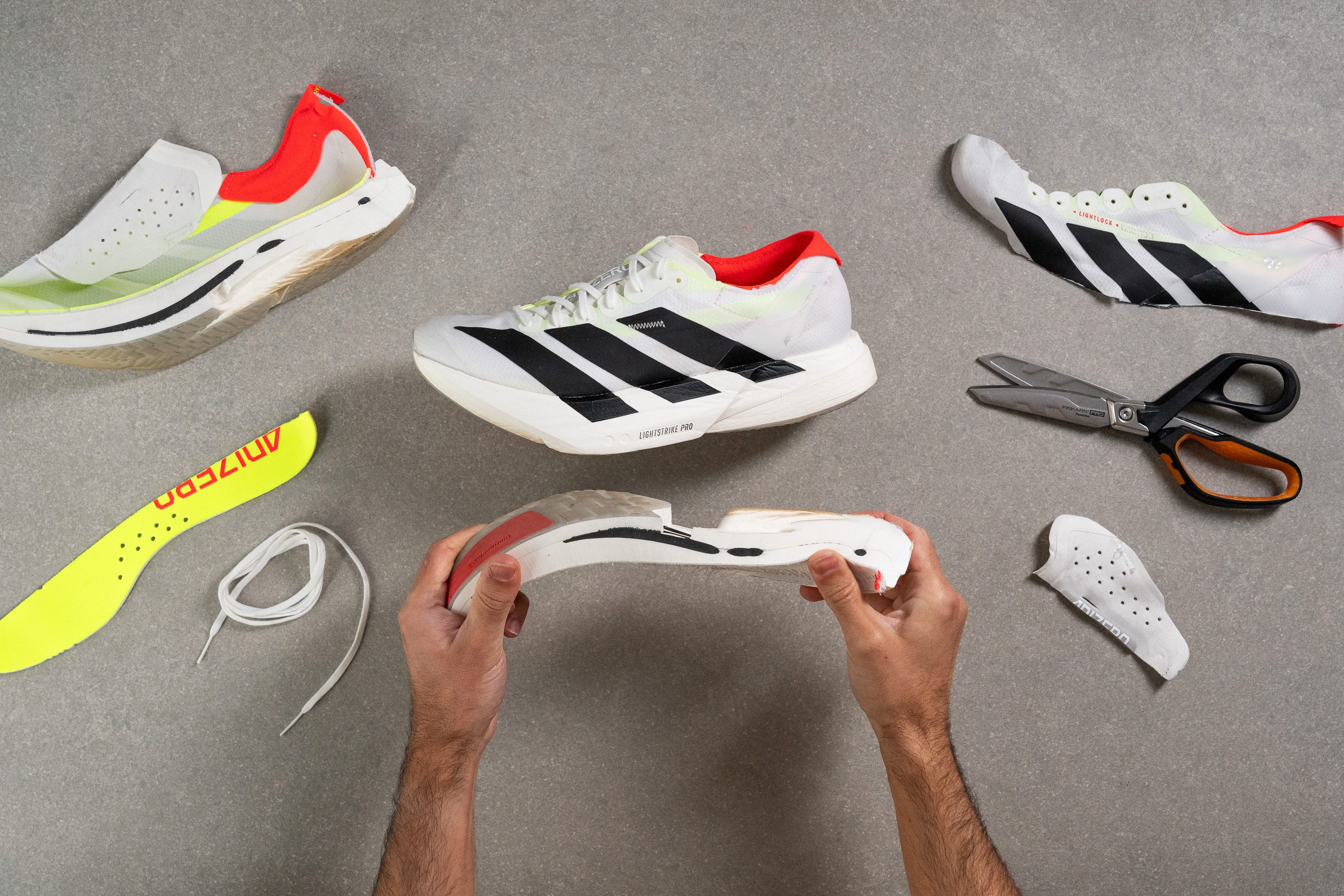
Estamos convencidos de que las Adidas Adizero EVO SL son una mejor opción para los corredores a los que el precio o la rigidez de las superzapatillas tradicionales no les hacen mucha gracia. El rendimiento es prácticamente igual que el de las Adios Pro 3 pero sin tener una placa de carbono, ofreciendo así una pisada más flexible, además de que es un modelo más asequible.
Amortiguación
Shock absorption
Con una puntuación de 142 SA, las Adios Pro 4 ofrecen una buena amortiguación para los corredores de cualquier tamaño, y es ideal tanto para maratones como para las carreras más interminables. También han mejorado un poco con respecto a sus predecesoras, que se llevaron 5 SA menos en la misma prueba.
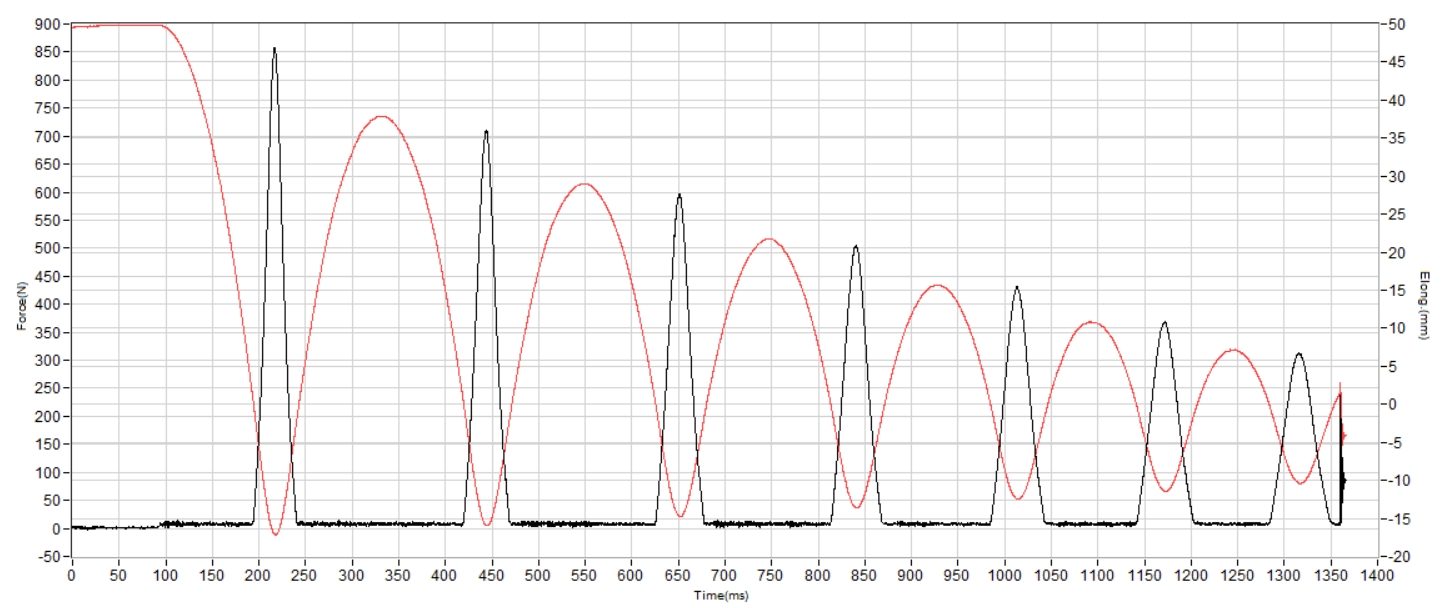
| Adizero Adios Pro 4 | 142 SA |
| Media | 130 SA |
Energy return
La nueva Lightstrike Pro de las Adios Pro 4 ya no está hecha de TPEE, ahora utiliza A-TPU. Este cambio trae varias ventajas que hemos analizado en esta review, pero más destacada de todas es el aumento en el retorno de energía.
La verdad es que alcanza unos límites impresionantes, ya que cuando lo medimos, nos dio 80,4 %. De todas las zapatillas de running que hemos analizado hasta la fecha, son las que se han llevado el resultado más alto. Pero claro, estos modelos siguen evolucionando, así que llegará el momento en el que alguno supere a las AP4. Solo que, después de analizar más de 200 zapatillas... que se lleven la medalla de oro es bastante impresionante, ¿verdad?
| Adizero Adios Pro 4 | 80.4% |
| Media | 58.6% |
Altura de la suela en la zona del talón
Uno de los pocos elementos que, en teoría, no cambia de las Adios Pro 3 a las Adios Pro 4, es la altura de la suela. Adidas afirma que mantienen el mismo diseño de 39/33 mm que el modelo anterior. Sin embargo, como suele ocurrir, nuestro calibre no estuvo del todo de acuerdo.
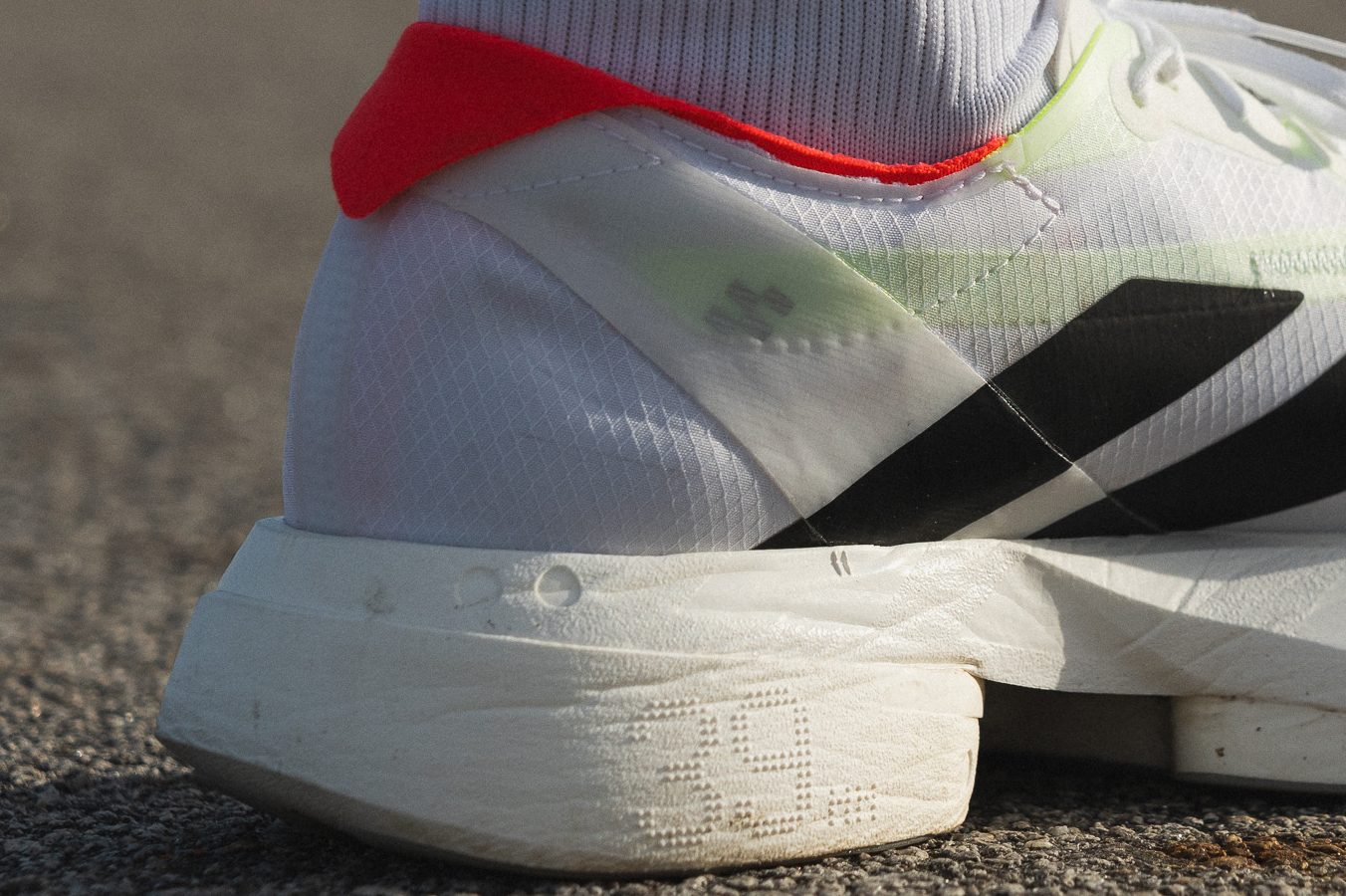
En el talón, marcó 36,6 mm, que está un poco por debajo de lo que dice Adidas (de hecho, ¡hasta lo pone en la mediasuela!). Sea como fuere, esta medida sigue respetando el límite de 40 mm establecido por la World Athletics.
Vamos, que hay un montón de amortiguación, así que estas zapatillas diseñadas pensando en el rendimiento están listas para aguantar distancias de 5K a maratones. Además, creemos que esta altura de la suela se adapta a los talonadores extremos con facilidad.
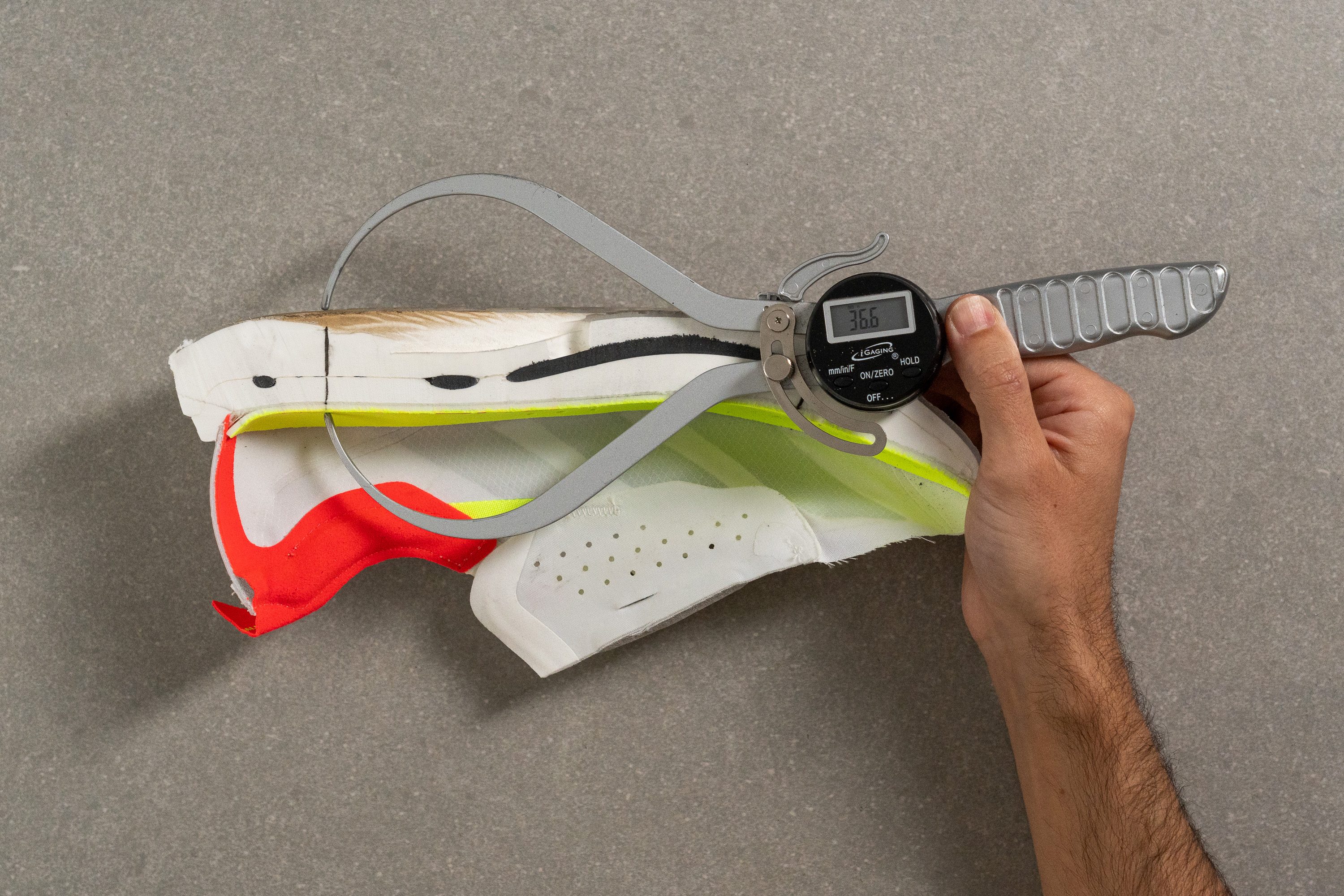
| Adizero Adios Pro 4 | 36.6 mm |
| Media | 34.8 mm |
Altura de la suela en el antepié
Cuando medimos la altura del antepié, nos dio 28,5 mm, casi igual que la de sus predecesoras, pero un poco más bajita de lo que indica Adidas. Sin embargo, esto no fue un problema cuando corrimos con ellas, ya que le ofrecen una buena sujeción tanto a los corredores de mediopié como a los de metatarsos.
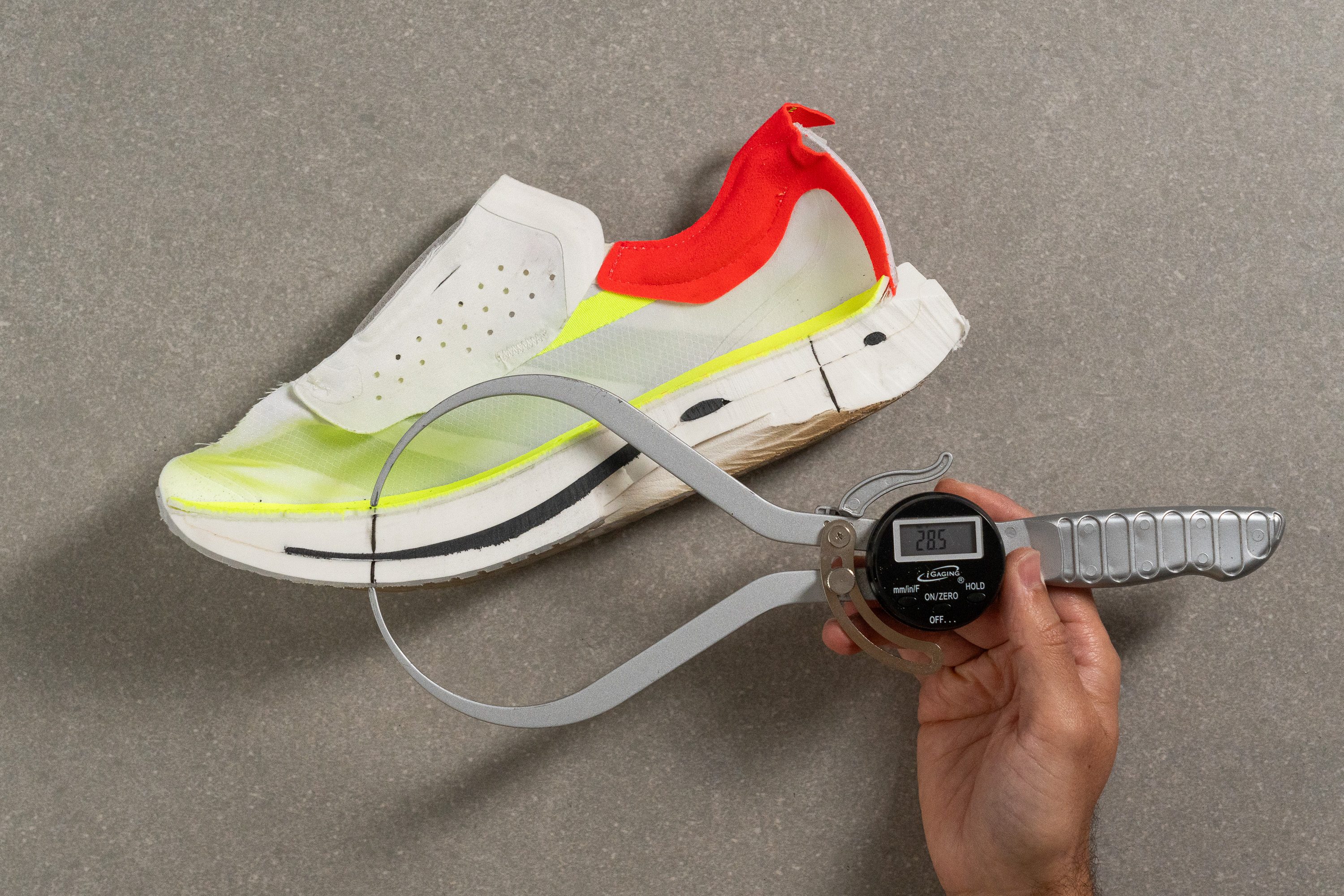
| Adizero Adios Pro 4 | 28.5 mm |
| Media | 26.2 mm |
Drop
La diferencia entre estas dos medidas (tomadas ambas en los puntos oficiales que estipula la World Athletics) nos dejaron con un drop de 8,1 mm.
Dicho esto, aunque el drop de 8 mm es el que se considera más universal, además de que es uno de los más populares entre las superzapatillas, la sensación es más como de un drop de 4 o 6 mm por su geometría. Se adaptan a cualquier técnica de carrera, pero como el diseño de su talón es estrecho, creemos que estas zapatillas les irán mejor a los corredores de mediopié o de metatarsos.
| Adizero Adios Pro 4 | 8.1 mm |
| Media | 8.6 mm |
Dureza de la mediasuela
ActualizadoPara los corredores que invierten en unas superzapatillas, la mediasuela siempre es un elemento crucial, y en RunRepeat nos encanta analizar las espumas de las zapatillas de running.
Aunque conserva el nombre Lightstrike Pro, introducido con la primera generación de las Adios Pro (que de apodo tienen Majambo) en 2020, no es la misma Lightstrike Pro que la de las Adios Pro 3. En su lugar, es una nueva formulación de TPEE supercrítica blandita hasta decir basta. Cuando la analizamos, nuestro durómetro marcó 29,3 AC, así que es bastante más mullida que la de las AP3, que obtuvo un resultado de 37,6 AC en esta misma prueba.
Creemos que Adidas se la ha jugado bastante con este cambio, ya que muchos corredores llenaron de halagos a las Adios Pro 3 por su estabilidad y su pisada firme pero con rebote. Ahora, las AP4 son todo lo contrario, convirtiéndose en unas de las superzapatillas más blandas del mercado. Que esta diferencia sea buena o mala solo depende de ti y de lo que valores en unas zapatillas de competición.
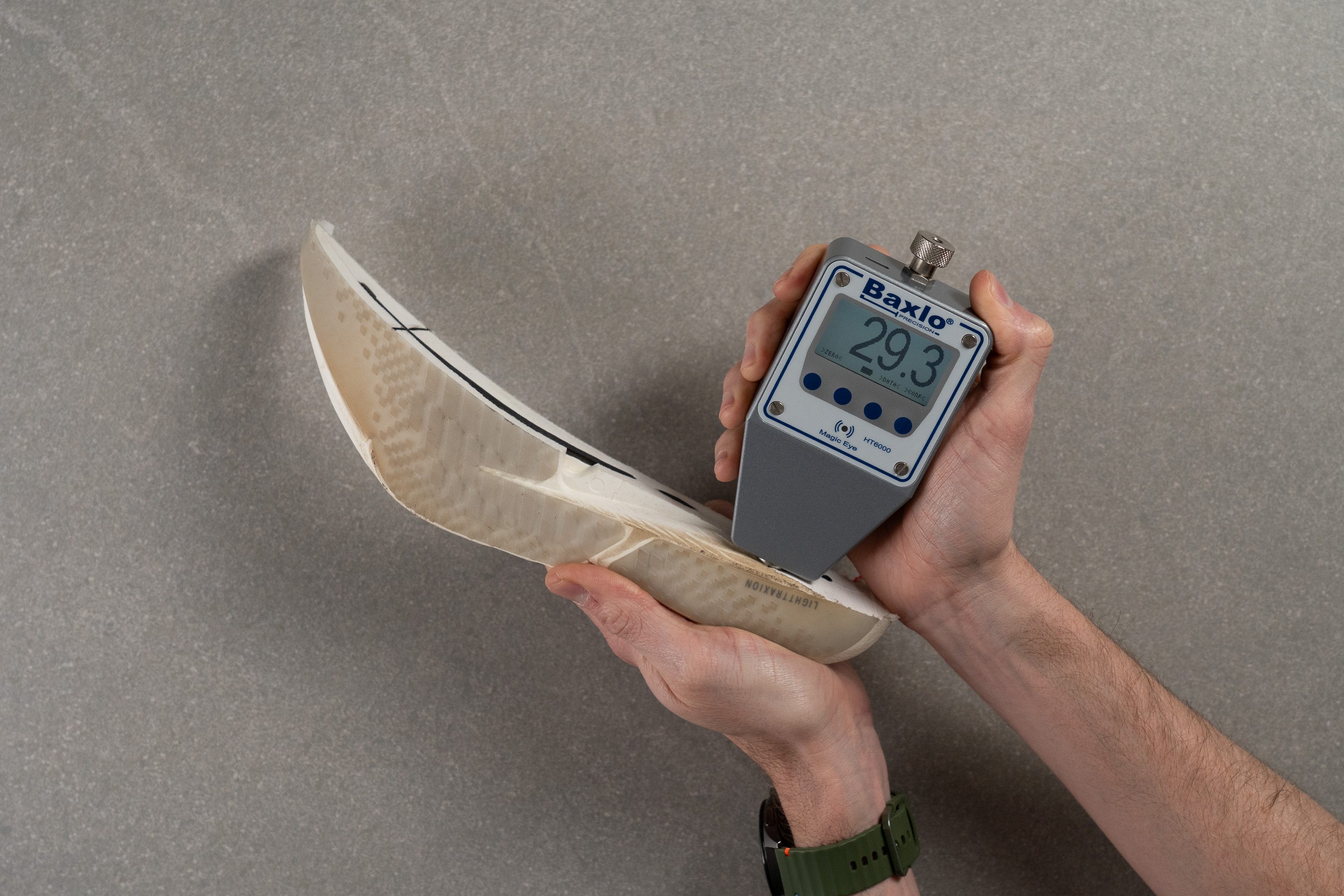
| Adizero Adios Pro 4 | 29.3 AC |
| Media | 36.4 AC |
Rocker
Una de las mayores ventajas de hacerles pruebas de laboratorio a las zapatillas de running es que lo medimos absolutamente todo. Así que vamos a dejar las cosas claras: a pesar de lo que puedas leer en otras páginas, las Adios Pro 4 tienen casi el mismo rocker que las Adios Pro 3. No están hechas imitando el modelo de las EVO 1 (cuyo rocker que empieza en el 60 % de las zapatillas, contando desde el talón hasta la punta), y los cambios son solo de unos pocos milímetros.
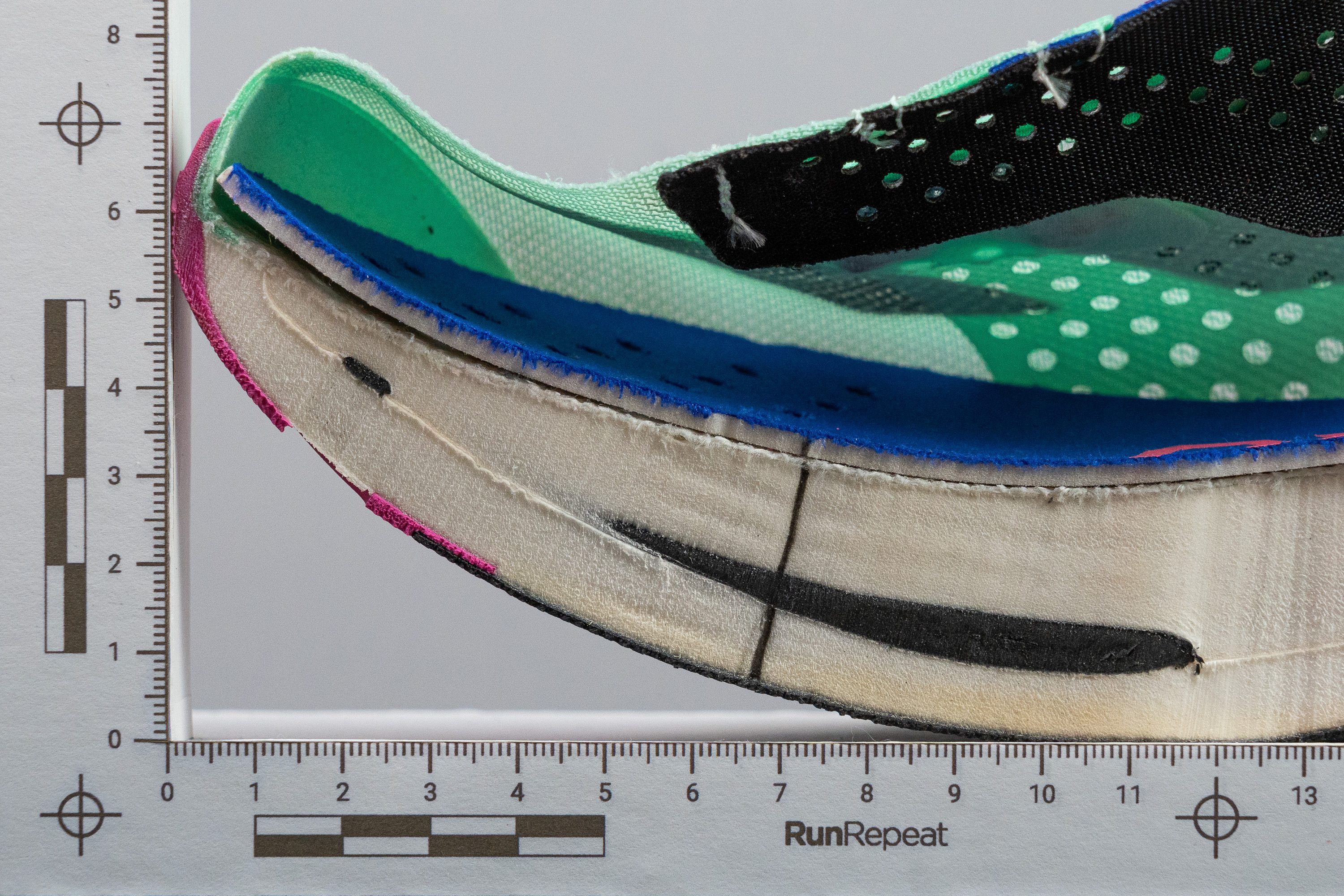
Gracias a nuestras pruebas, descubrimos que el rocker de las Adios Pro 3 y el de las Pro 4 son muy parecidos, con solo un par de pequeños ajustes influenciados, principalmente, por la suela exterior actualizada LIGHTTRAXION. Y sí, sigue yéndoles de maravilla tanto a los corredores de mediopié como a los de metatarsos.
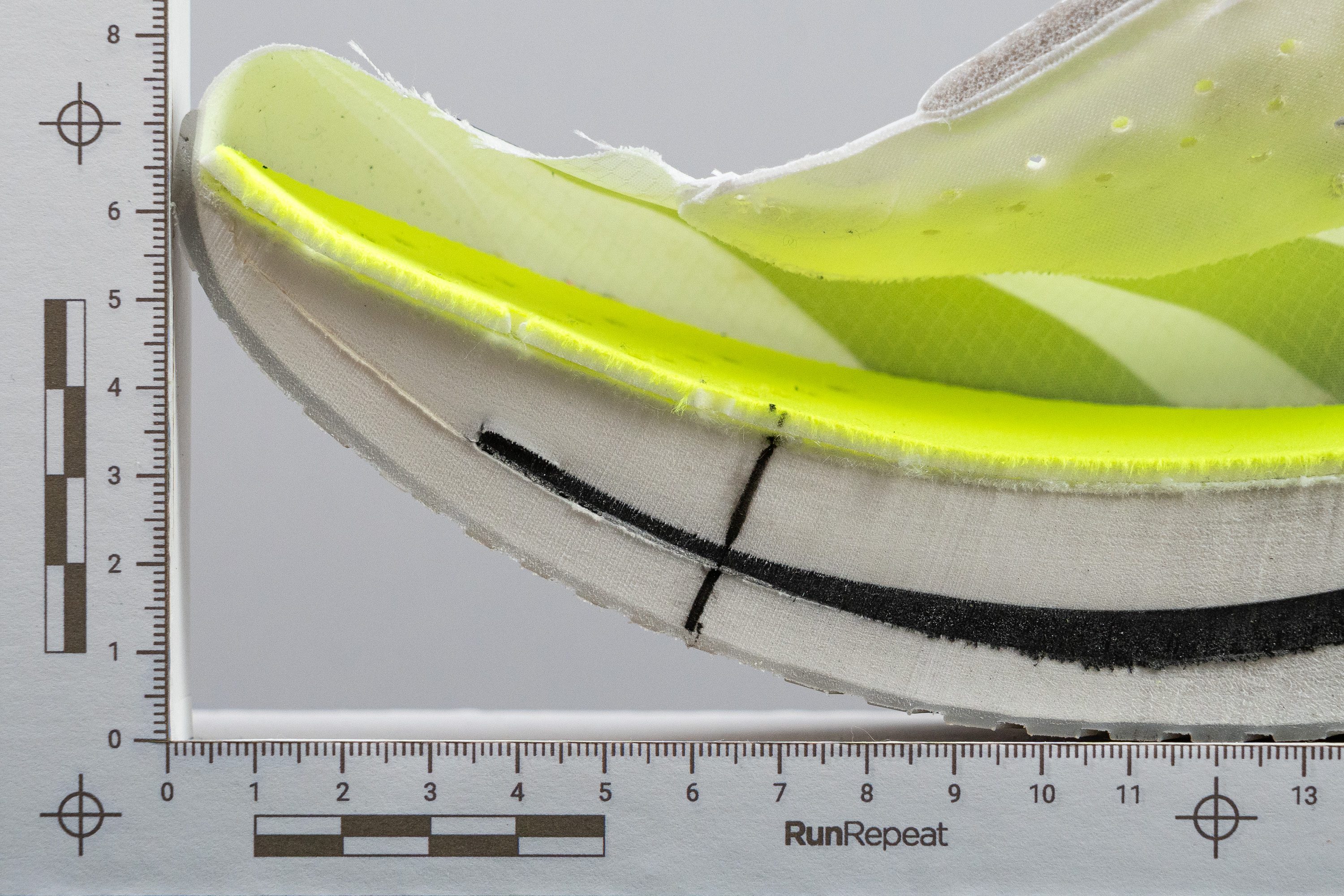
Lightstrike Pro
Como decíamos antes, puede que se llame igual (que es algo que suelen hacer las marcas) pero esta Lightstrike Pro es distinta que la de las versiones anteriores, así como de la de otros modelos que Adidas ha sacado hasta día de hoy, como las Adizero SL2. Y para demostrarlo, cortamos la espuma aquí en el laboratorio y la pusimos bajo nuestro microscopio digital.
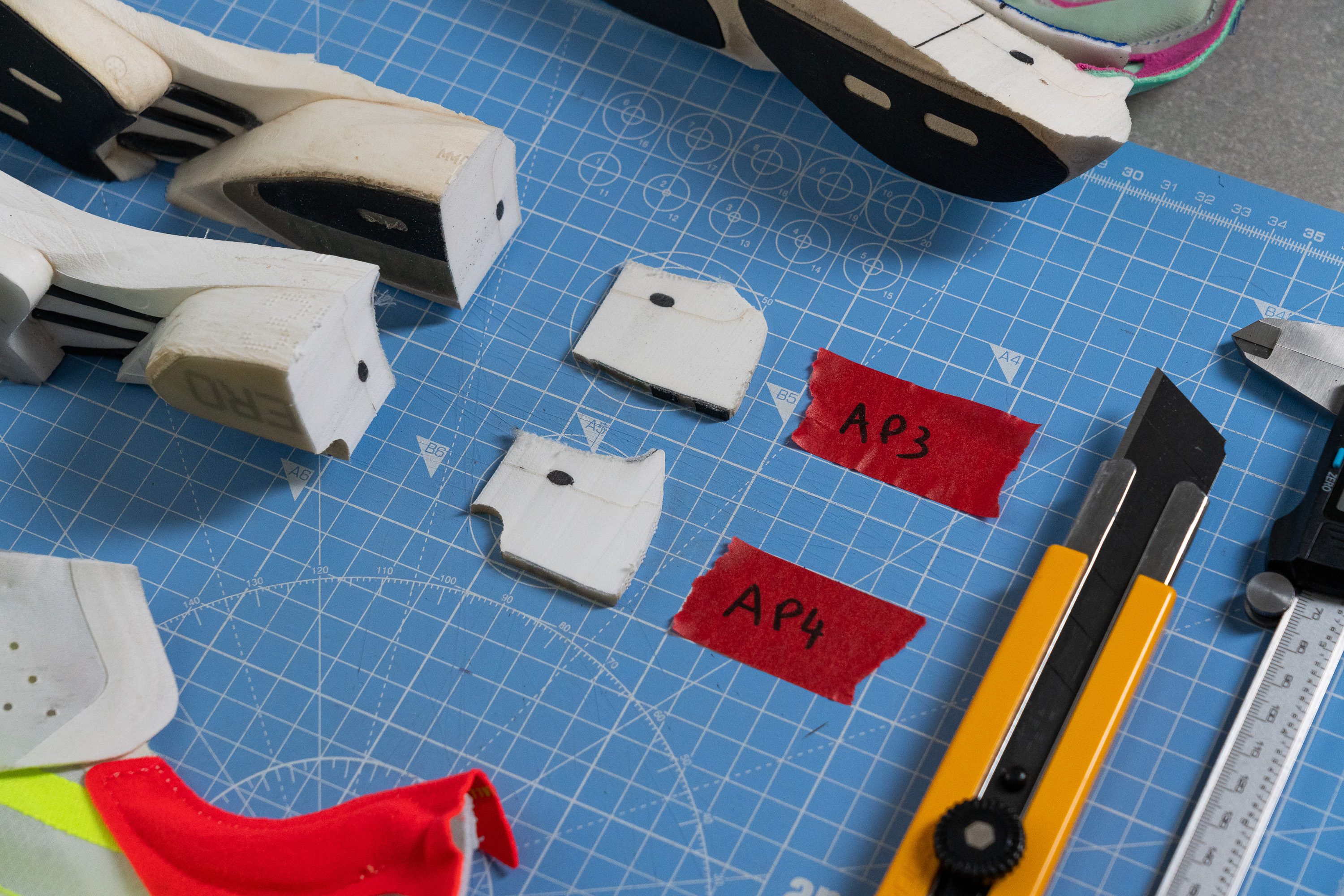
Los resultados son claros: la antigua formulación de la espuma de las Adios Pro 3 es bastante más densa y pesada, mientras que la de las Adios Pro 4 es mullida y ligera. Aunque que la espuma ahora sea más blanda es algo que les puede llamar la atención a muchos corredores, tiene un punto negativo importante: ya te puedes ir olvidando de la legendaria y casi increíble durabilidad de la formulación anterior de la Lightstrike Pro en esta versión actualizada.
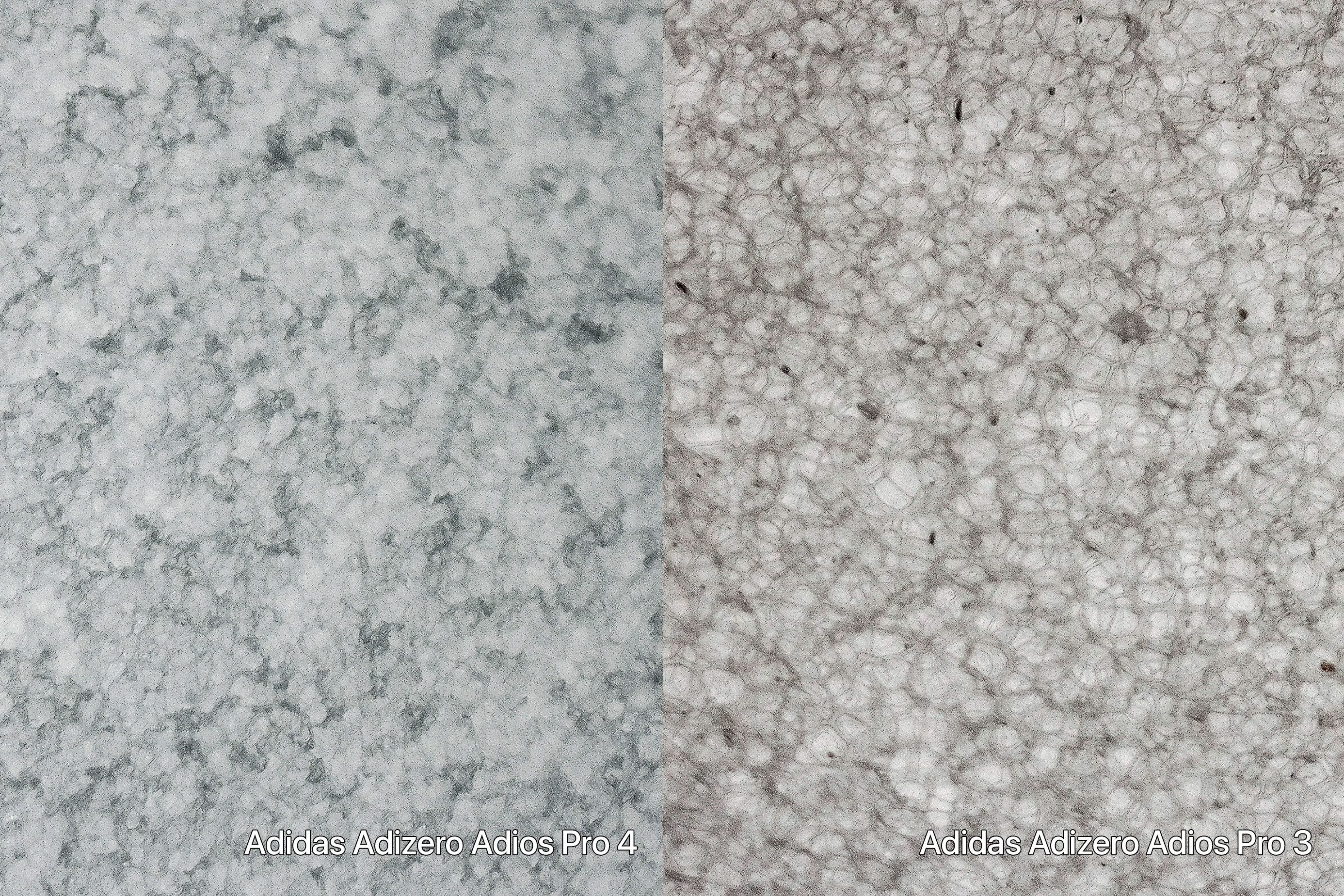
Esta nueva fórmula se parece mucho más a la ZoomX o a la FF Turbo+, y concuerda más con la mayoría de las espumas de las superzapatillas. Según nuestra experiencia, estos materiales ofrecen su máximo rendimiento durante 160 km, y después este decae bastante rápido. Sí, siguen siendo unas zapatillas de entrenamiento sólidas, pero pierden ese rebote tan increíble y la magia de su reactividad. Este declive no fue para nada pronunciado con las Adios Pro 3, pero créenos, en las Adios Pro 4 sí que se nota.
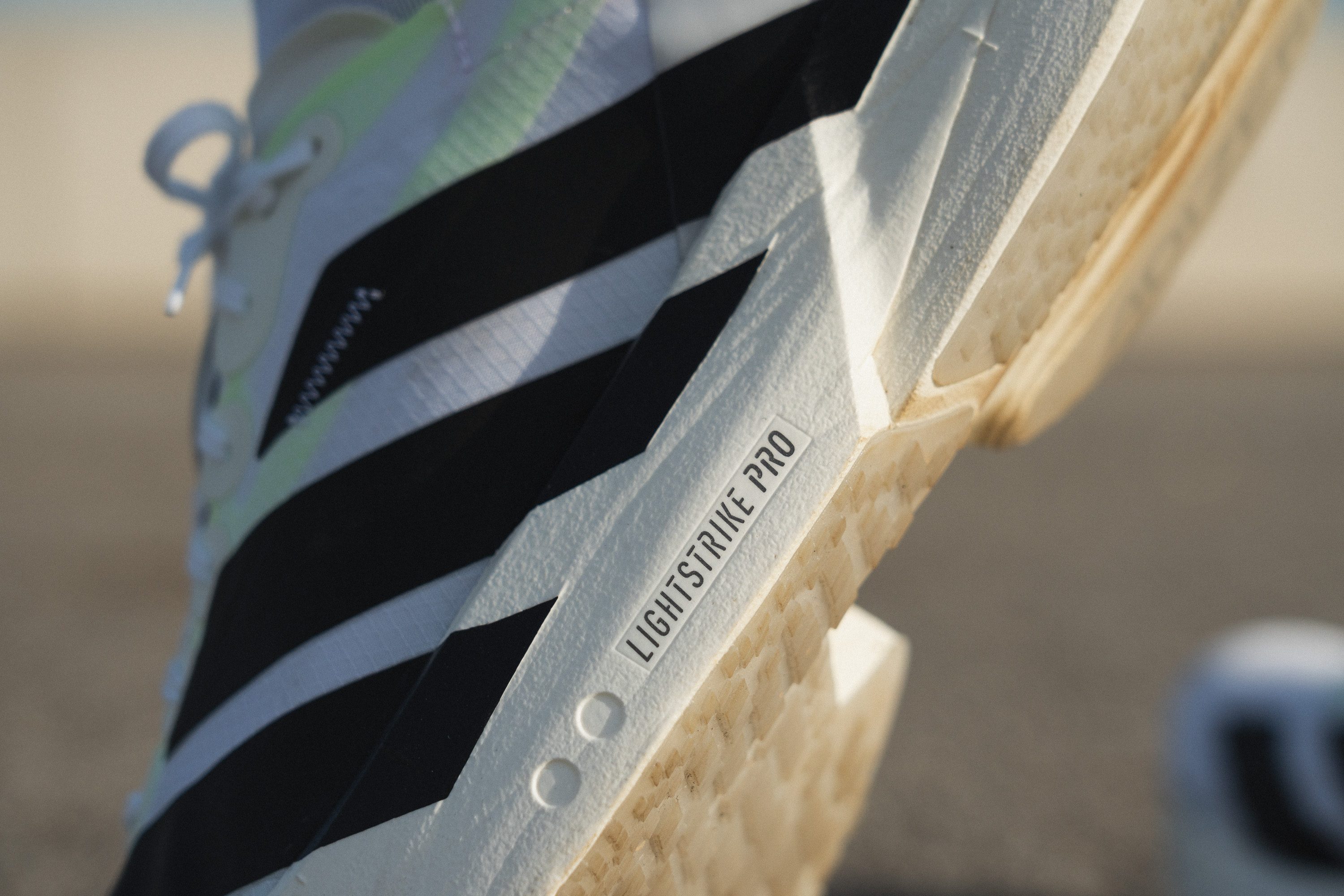
Barras de energía 2.0
Aunque la espuma es distinta a la que Adidas utiliza en las Adios Pro 3, el sistema Energy Rods 2.0 permanece intacto. Tiene 5 varillas de carbono que imitan los huesos del pie, proporcionando la rigidez necesaria para que el diseño de estas superzapatillas funcione. La verdad es que es algo que no nos esperábamos, ya que la marca les puso una placa de carbono a las Adios Pro Evo 1, lo que nos llevó a muchos a creer que las AP4 seguirían ese mismo ejemplo, pero no.
Como decimos siempre, esto tiene tanto puntos positivos como negativos. Un problema recurrente de las AP3 era que sus Energy Rods se rompían, haciendo "clic" cada vez que dábamos un paso (cosa que nos pareció muy molesta, la verdad). Aunque es demasiado pronto para saber si a las AP4 les pasará lo mismo, creemos que su espuma más blanda podría mitigar este problema.
Según nuestra experiencia, hay muchos fans que prefieren el sistema Energy Rods 2.0 a una placa de carbono tradicional, así que seguro que se alegran de esta consistencia por parte de Adidas.
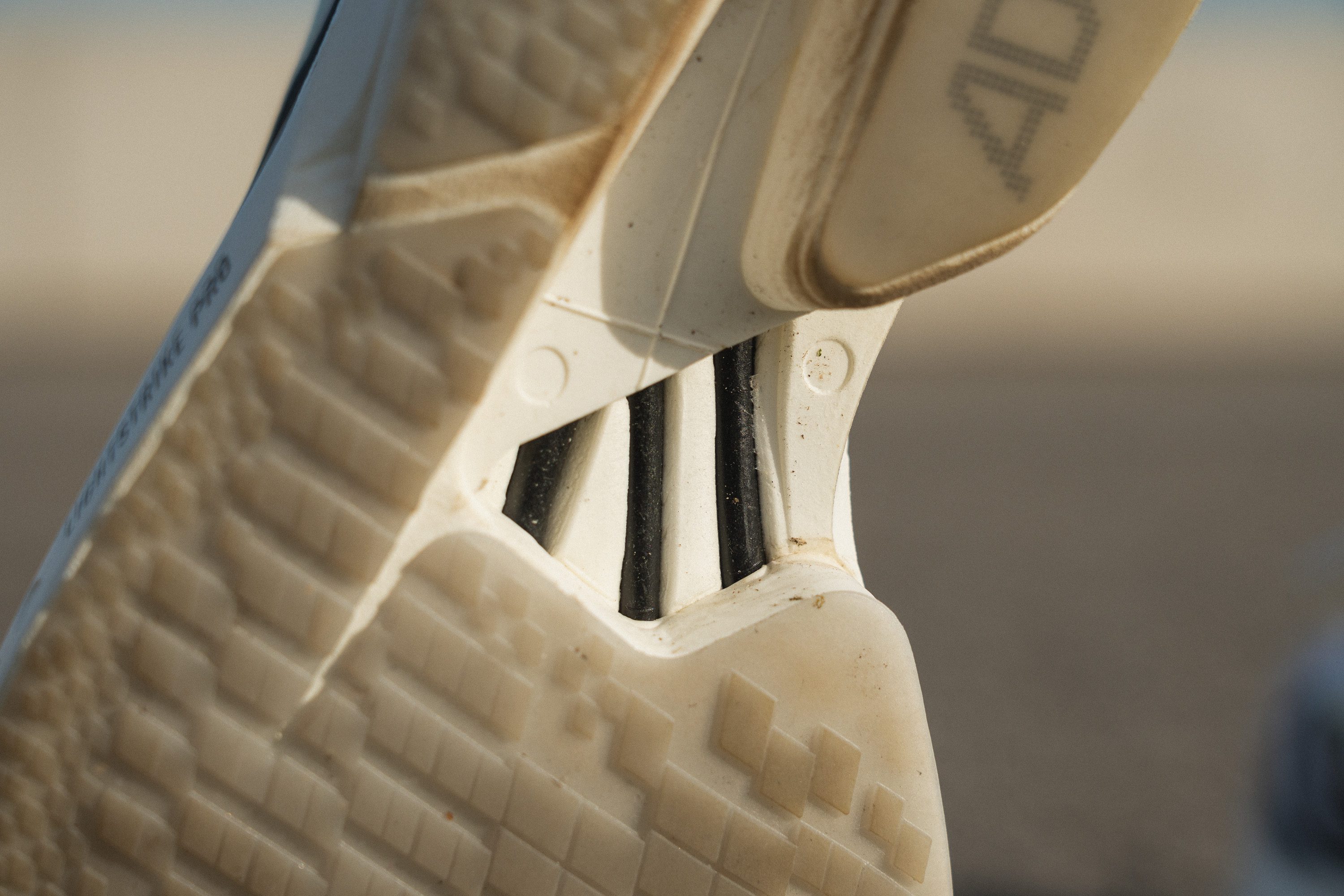
Tallaje y ajuste
Talla
Las Adidas Adizero Adios Pro 4 quedan un poco pequeñas (398 votos).
Anchura / Ajuste
Una de las características más destacadas de las Adios Pro 3, así como uno de los motivos clave de su popularidad, es que tienen un ajuste generosamente espacioso en comparación con la mayoría de las superzapatillas. Esto es algo que nos encantó, sobre todo teniendo en cuenta que el mercado está saturado de modelos de competición con diseños estrechos. Sin embargo, Adidas ha tomado un camino diferente con las Adios Pro 4, que ya no se dirigen a los corredores con pies anchos. De hecho, creemos que ahora son más adecuadas para las personas con pies estrechos.
Para entender estos cambios, hicimos un molde de gel del interior de las Adios Pro 4. Cuando medimos su parte más ancha, nos dio 93,2 mm, que es bastante menos que los 95,5 mm que medimos en las Adios Pro 3.
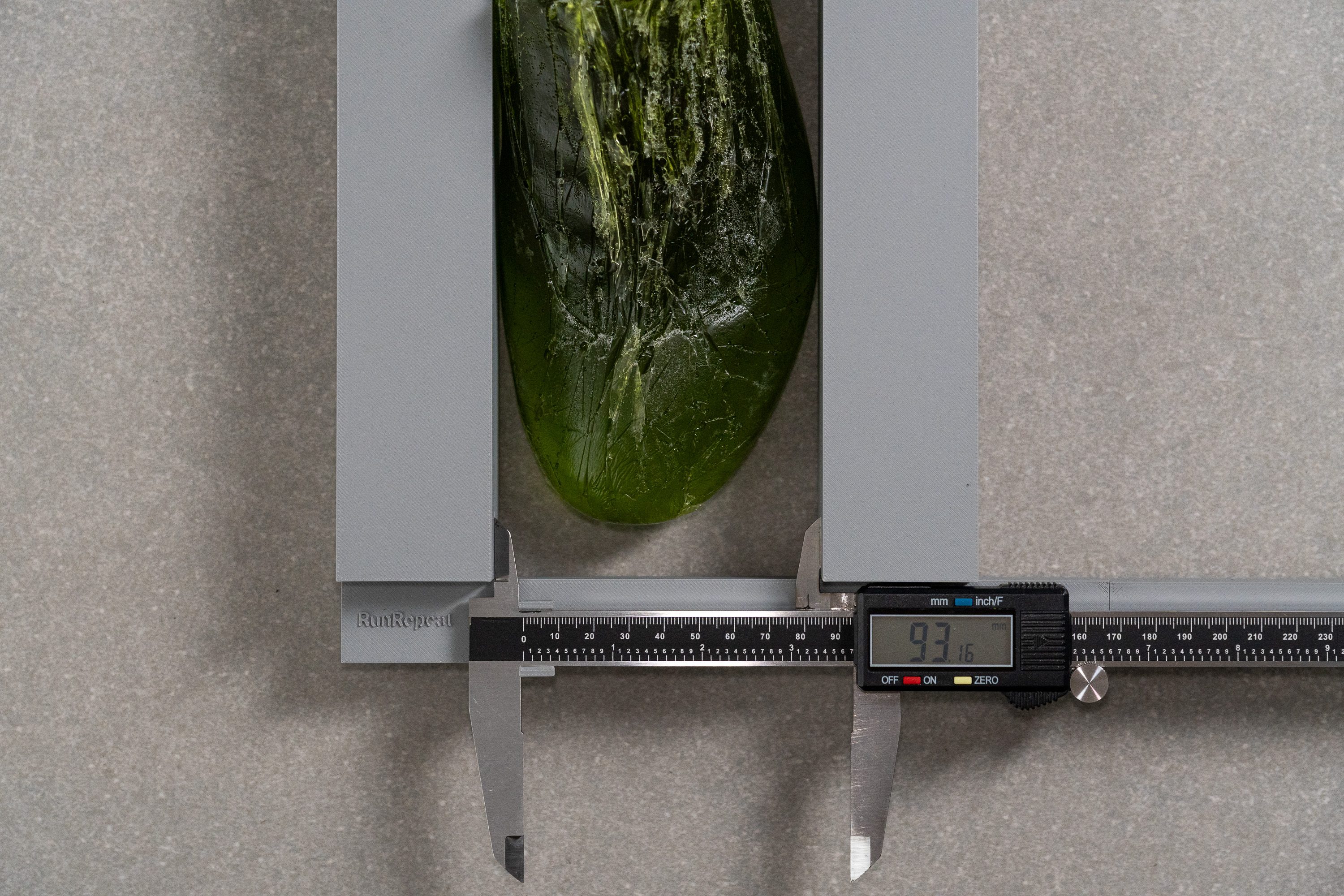
| Adizero Adios Pro 4 | 93.2 mm |
| Media | 95.1 mm |
Anchura de la parte delantera
Después medimos la zona del dedo gordo, que es un punto clave para muchos corredores.
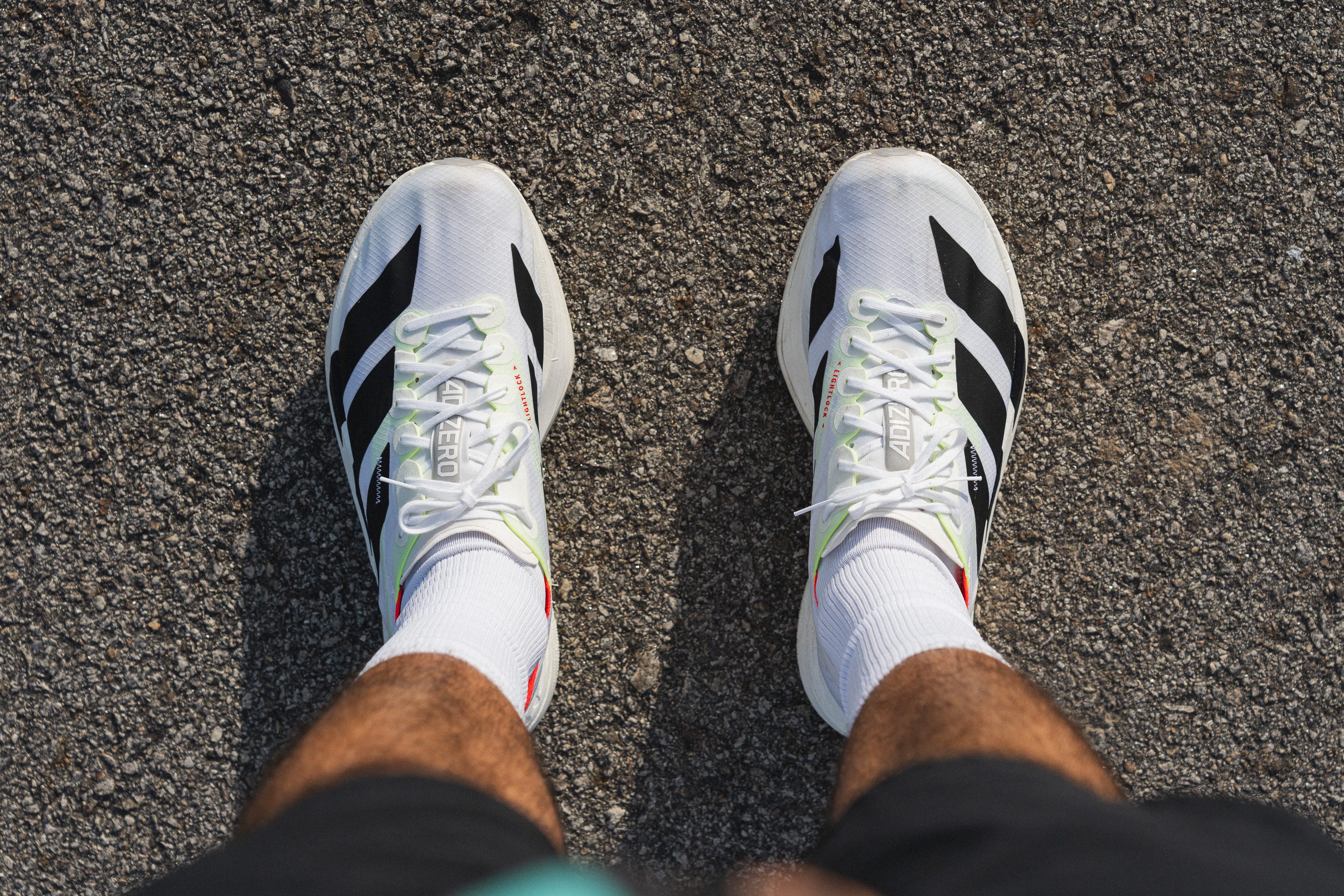
Con 69,5 mm, no podemos negar que estas zapatillas se estrechan bastante hacia la punta. Para darte algo más de contexto, cuando medimos las Adios Pro 3 en este mismo sitio, nuestro calibre marcó 77,8 mm, así que tienen un ajuste mucho más amplio e ideal para los corredores con pies cuadrados. Basándonos en estos resultados, creemos que las personas con pies anchos deberían optar por las Adios Pro 3 para disfrutar de una comodidad y un rendimiento óptimos, sobre todo en las distancias de maratón.
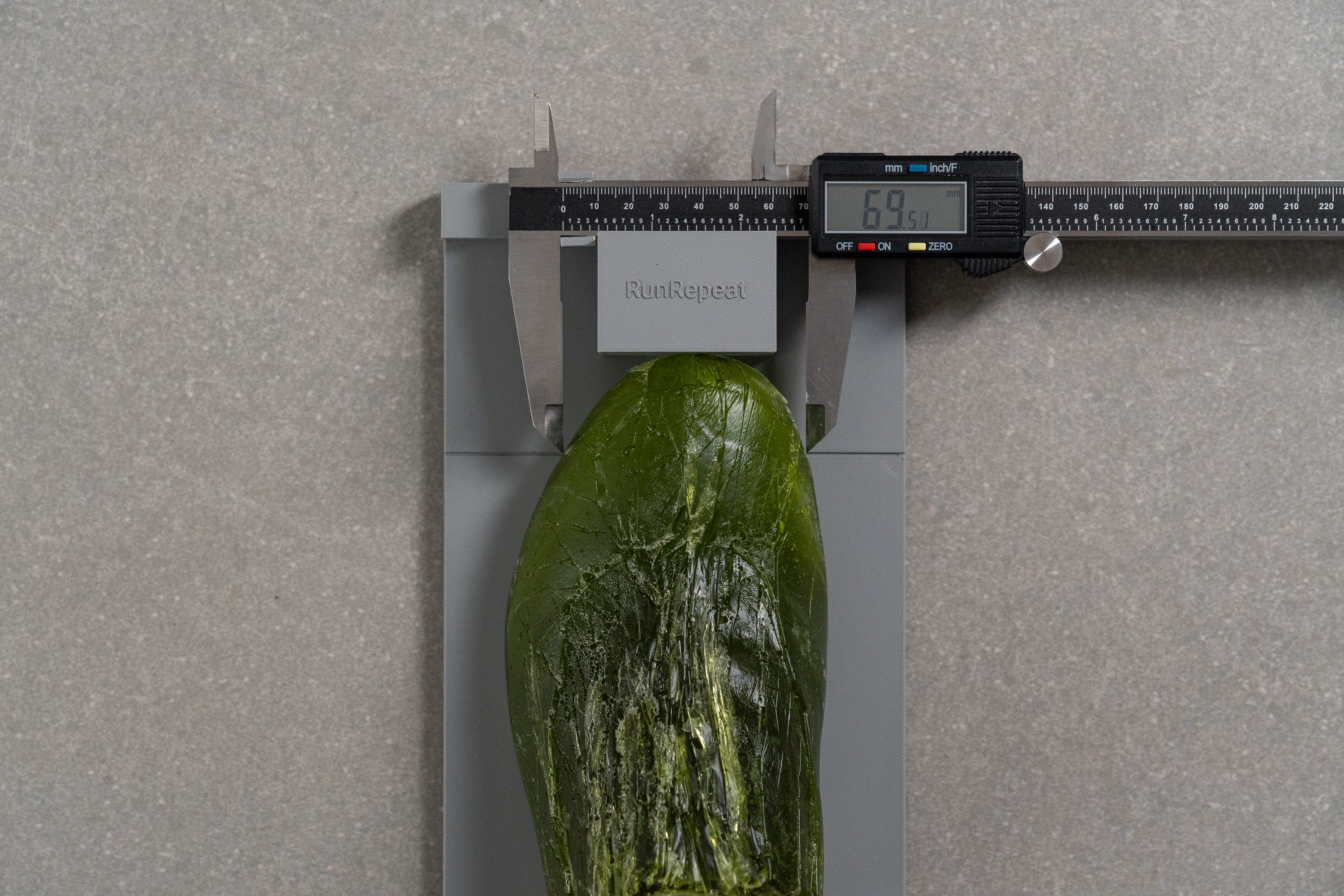
| Adizero Adios Pro 4 | 69.5 mm |
| Media | 73.3 mm |
Altura de la parte delantera
Comprobamos que la altura de la parte superior es generosa, con 28,3 mm, así que hay mucho espacio vertical.
Este diseño minimiza el riesgo de acabar con las uñas negras... siempre que elijas la talla adecuada, claro, que es un detalle muy importante en las Adios Pro 4 al tener una protección firme en la zona de los dedos.
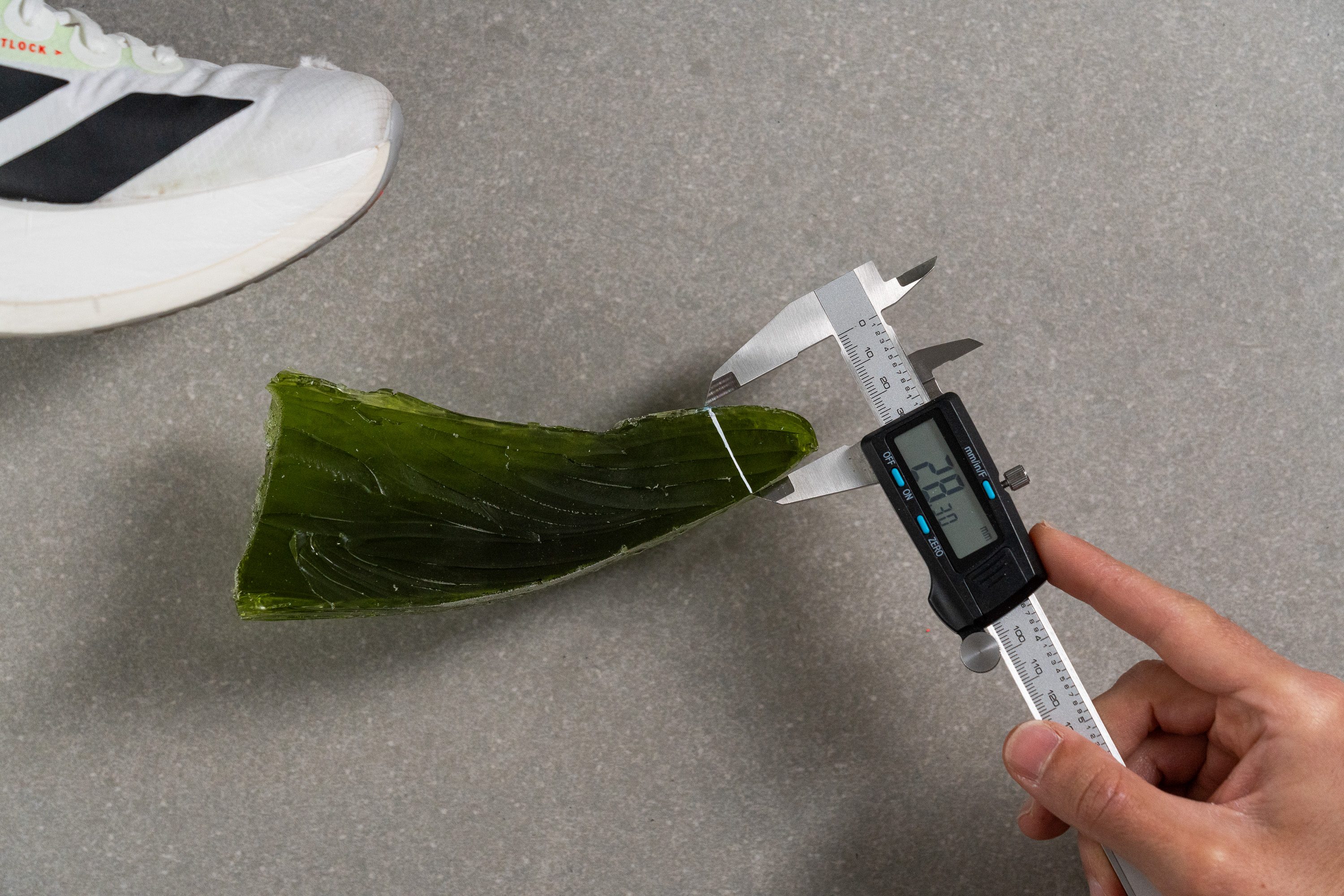
| Adizero Adios Pro 4 | 28.3 mm |
| Media | 27.0 mm |
Tracción / Agarre
Traction test
La versión 4 reemplaza el diseño totalmente de caucho Continental con una tecnología más nueva llamada LIGHTTRAXXION, conservando solo un pequeño parche de Continental (que es algo que nos preocupó un poquito en el laboratorio, no te vamos a mentir). Sin embargo, las Adios Pro 4 solo se llevaron un resultado un 0,04 más bajo que las Pro 3, así que su 0,55 es ideal para cualquier modelo, ofreciendo un agarre excelente incluso en los maratones bajo la lluvia.
| Adizero Adios Pro 4 | 0.55 |
| Media | 0.49 |
Diseño de la suela exterior
Las Adios Pro 4 siguen teniendo una amplia cobertura de caucho, una característica distintiva de la serie y una ventaja clave frente a otras superzapatillas.
La suela tiene una pequeña sección de Continental en el antepié, con el resto cubierto por el nuevo LIGHTTRAXION, un compuesto muy blandito que ya hemos visto antes y que ofrece un agarre excepcional.
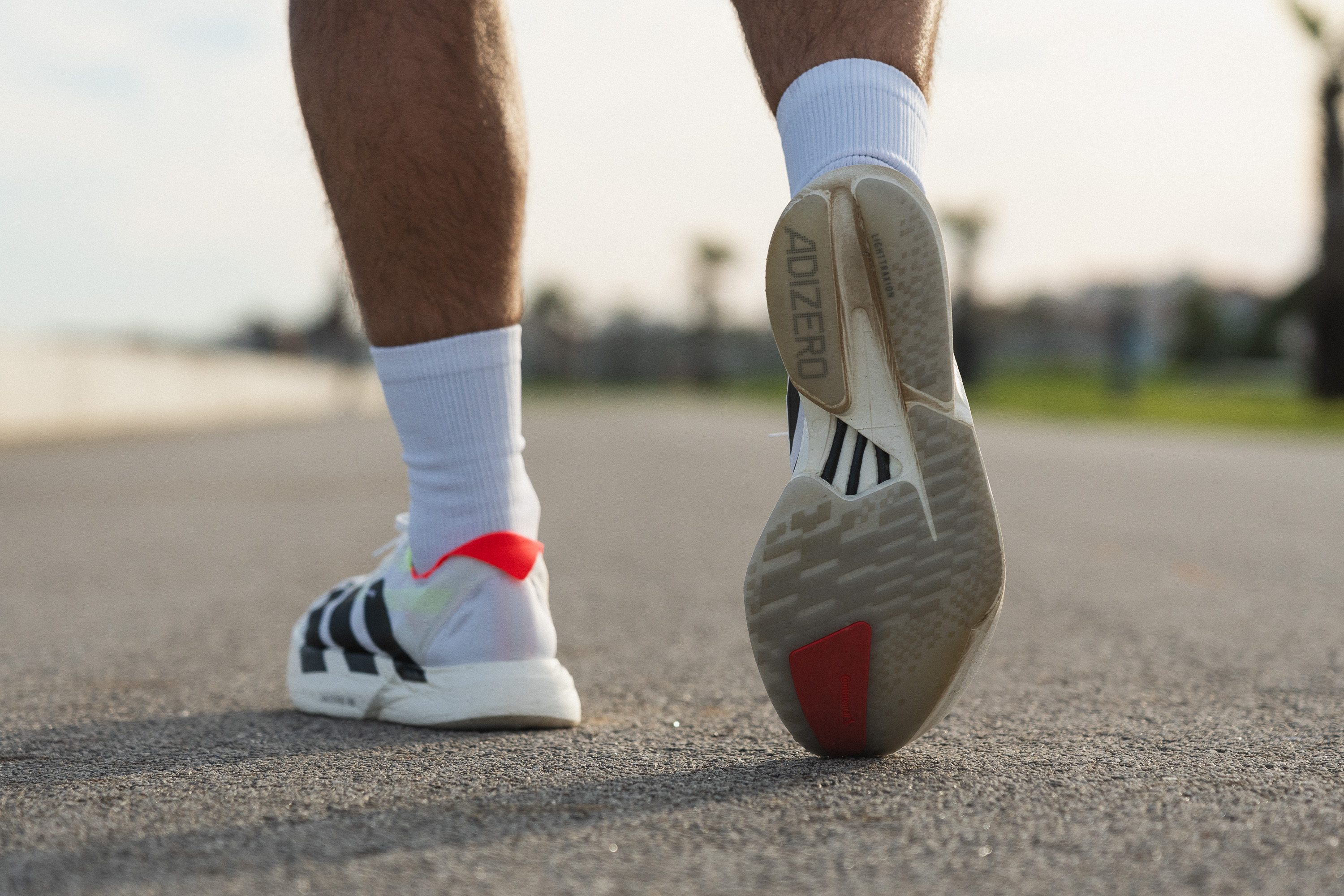
Flexibilidad / Rigidez
La combinación de la nueva espuma Lightstrike Pro y las Energy Rods 2.0 hizo que los resultados de nuestra prueba de flexibilidad fuesen coherentes con los de la prueba de rigidez torsional. En lugar de las puntuaciones estratosféricas de las zapatillas con placa de carbono, las Adios Pro 4 necesitaron solo 22,7 N de fuerza para doblarse, así que son unas de las superzapatillas menos rígidas del mercado.
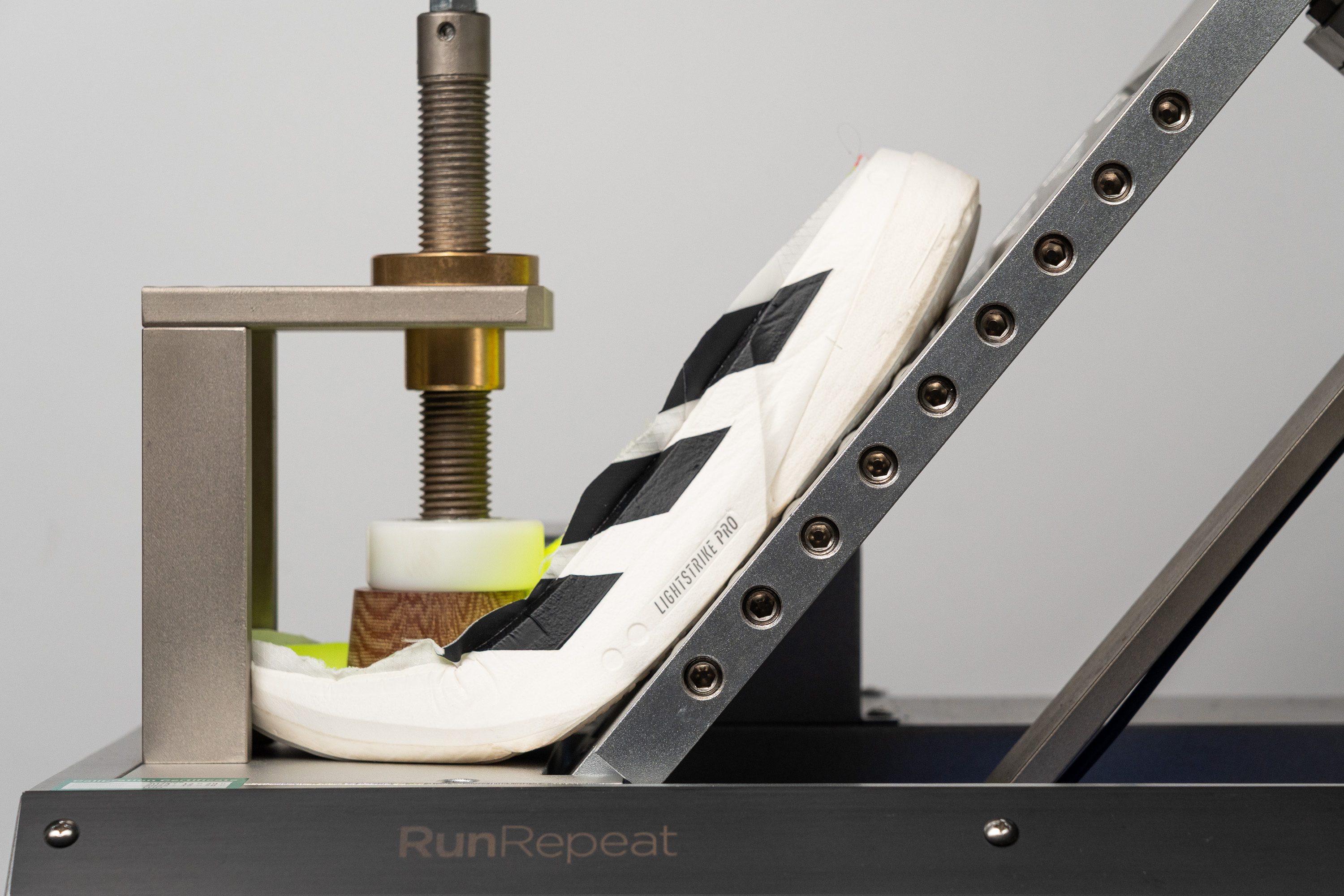
| Adizero Adios Pro 4 | 22.7N |
| Media | 15.3N |
Peso
Con un peso de tan solo 200 g, las Adios Pro 4 han mejorado bastante, ya que son un 8 % más ligeras que sus predecesoras. Esto hace que al fin puedan estar a la altura de sus competidoras, ya que muchas superzapatillas de 2023 y 2024 ya no llegan a los 200 g.
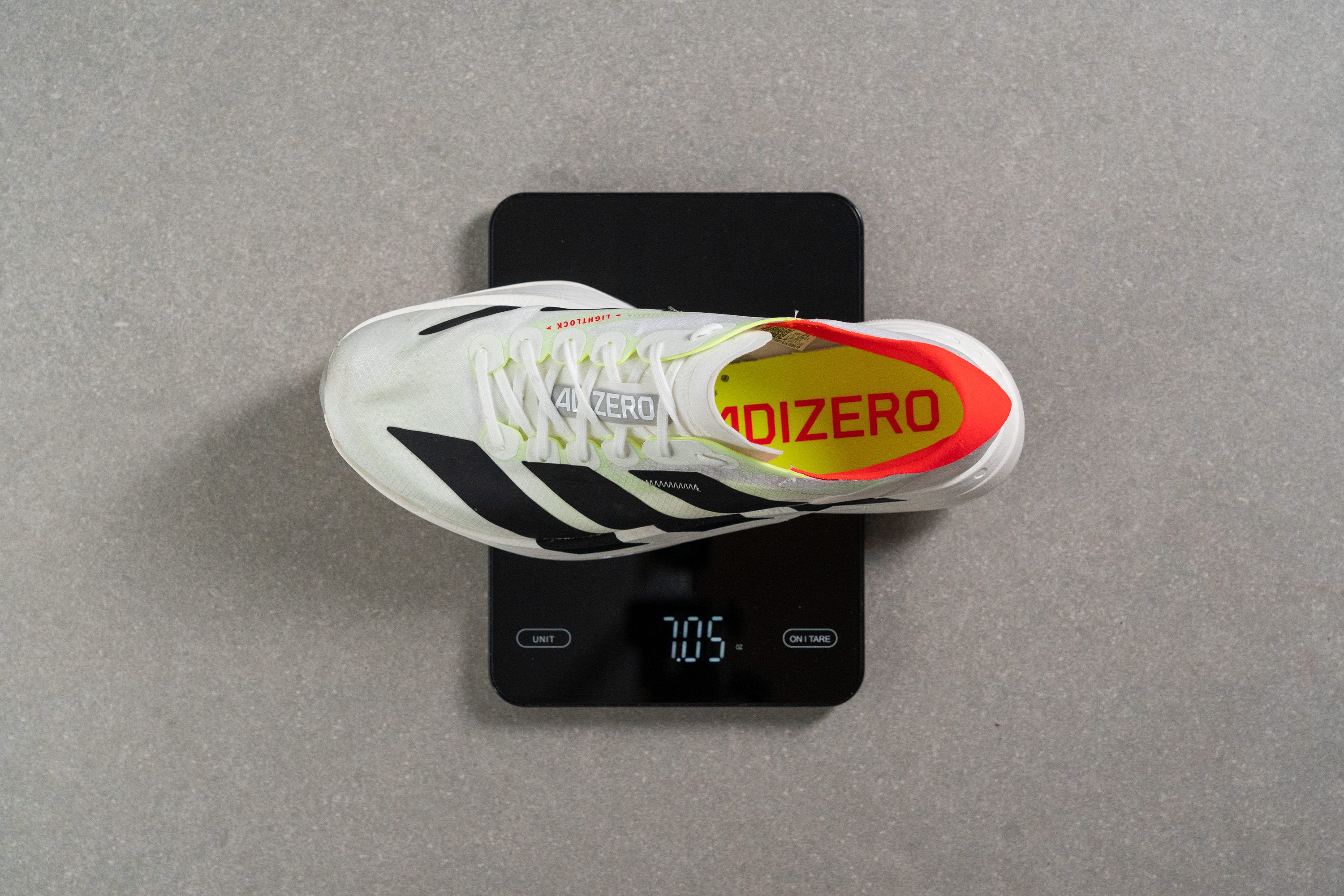
| Adizero Adios Pro 4 | 7.1 oz (200g) |
| Media | 9.3 oz (264g) |
Transpirabilidad
Cuando examinamos por primera vez las Adios Pro 4, que no les viésemos agujeritos para mejorar el flujo de aire hizo que tuviésemos dudas sobre su transpirabilidad. Sin embargo, ha habido pruebas de laboratorio anteriores que han demostrado que algunas zapatillas sin estos agujeritos siguen ofreciendo un buen flujo de aire... solo que este no es el caso.
Adidas utilizó su novedosa tecnología LIGHTLOCK en este modelo, que está diseñada para dejar que la parte superior se estire longitudinalmente mientras permanece estable lateralmente para mejorar la sujeción. Aunque esto aumenta la estabilidad, nuestra prueba de humo reveló que las AP4 son menos transpirables que algunas de sus competidoras, como las Vaporfly 3, ya que solo pudimos darles un 2/5 en esta prueba.
Nuestra potente luz LED reveló que Adidas priorizó reducir el peso en el upper, que es algo que se ve en la estructura prácticamente inexistente del talón. Sin embargo, las icónicas tres líneas se utilizan, ingeniosamente, para proporcionar una mayor estabilidad.
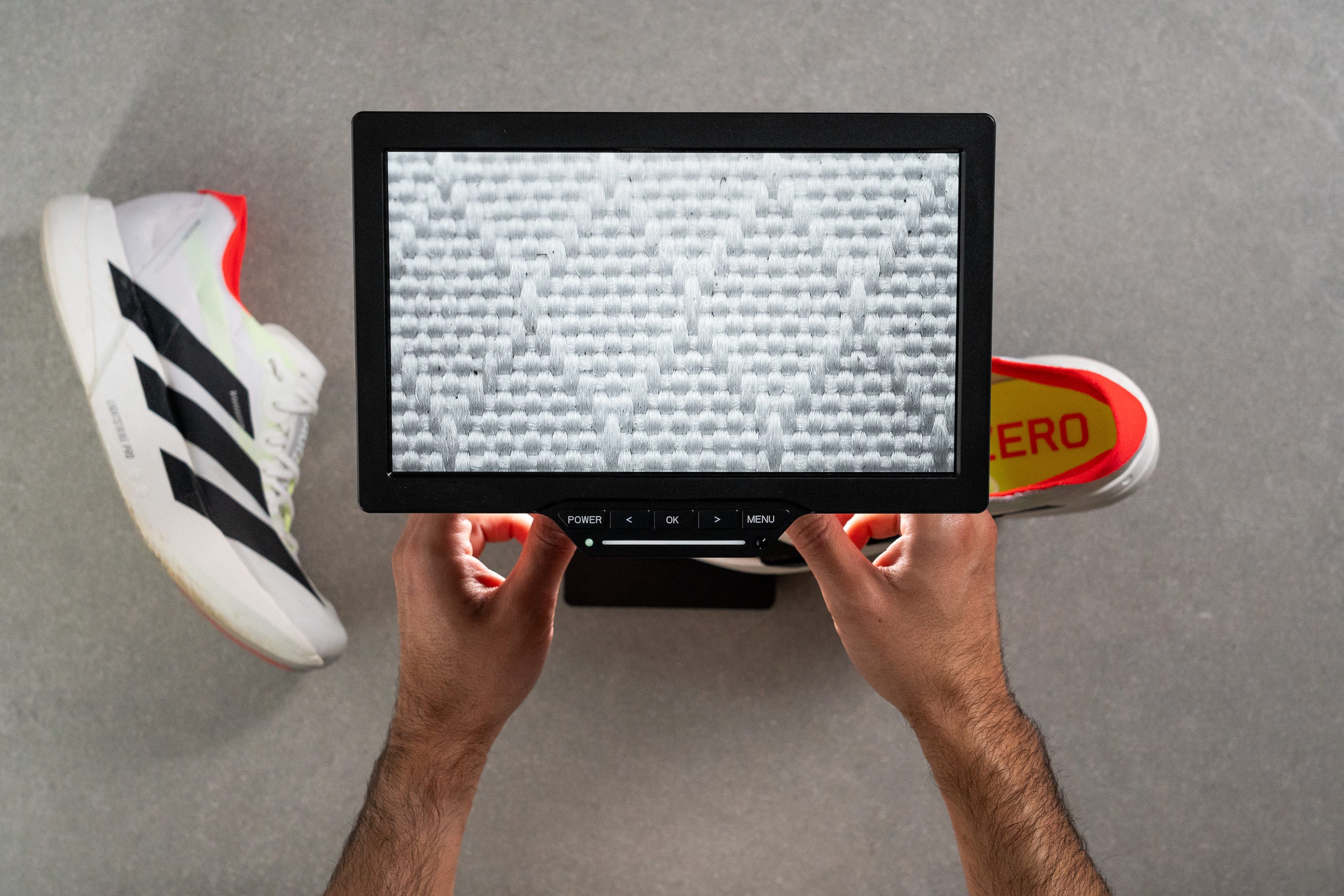
Gracias a nuestro microscopio, descubrimos que la parte superior parece incluso una membrana de Gore-Tex, bloqueando el flujo de aire por completo. Ponerle agujeritos en la zona de los dedos podría solucionar este problema, aunque a lo mejor eso no sería compatible con la tecnología LIGHTLOCK.
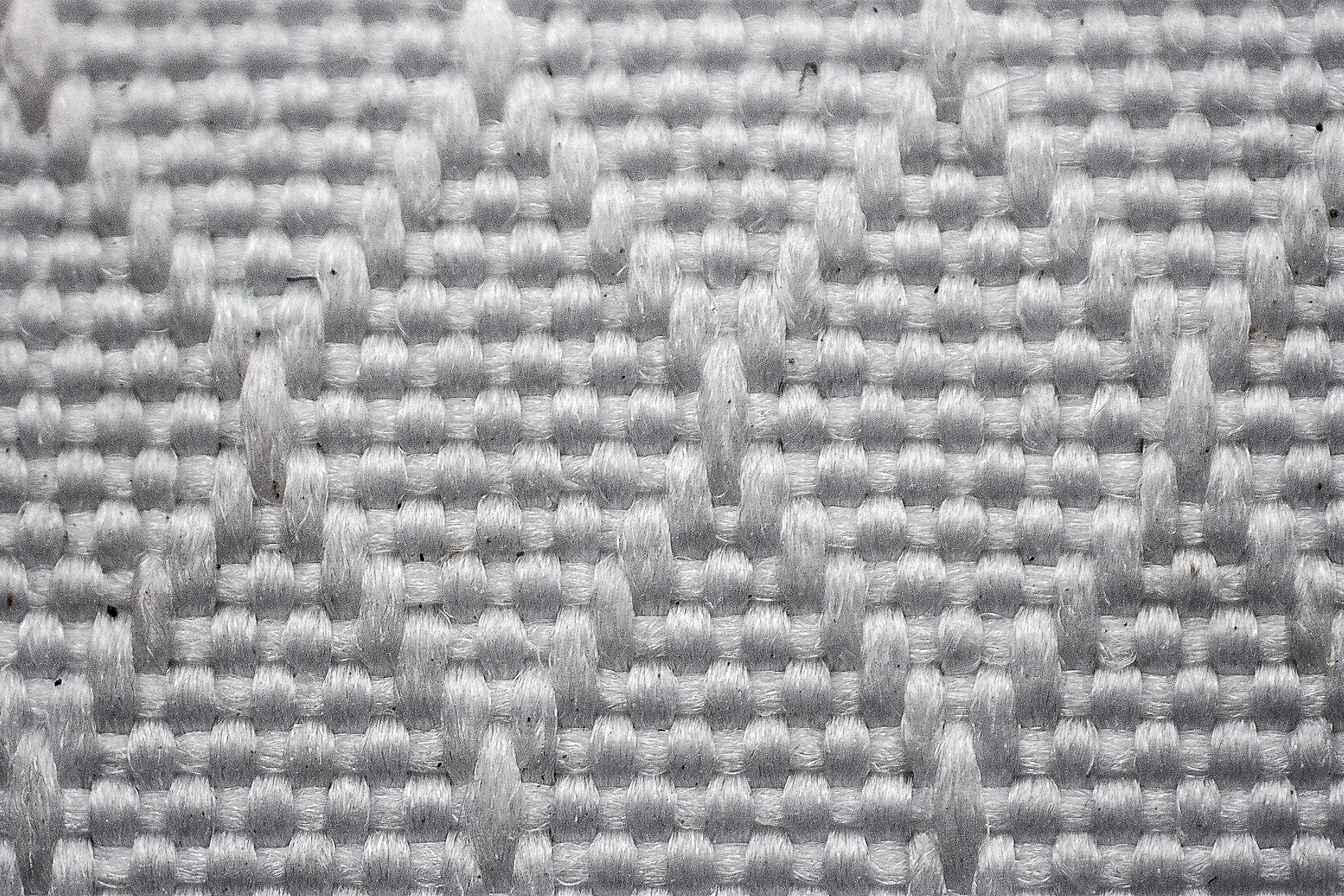
Aunque no es muy transpirable, el upper de este modelo es ligero como una pluma y, en nuestra opinión, esto marca una mejora importante en relación con las Adios Pro 3, ya que a muchos corredores les parecieron muy incómodas.
Y como la mayoría de las carreras son en climas fríos, que este modelo no sea el más transpirable del mercado a lo mejor no te echa para atrás del todo a la hora de comprártelo, aunque sí que pensamos que es necesaria una mejora.
| Adizero Adios Pro 4 | 2 |
| Media | 3.7 |
Estabilidad
Prueba de estabilidad lateral
Cuando nos compramos las Adios Pro 4, teníamos un montón de ganas de que nos llegasen y poder empezar a hacerles pruebas. ¿Por qué? Pues porque otra de las ventajas clave de las AP3 era su estabilidad, y al oír que todo el mundo se volvía loco por lo blandas que eran las Adios Pro 4, nos preguntábamos cómo Adidas había gestionado esta situación.
Descubrimos que este modelo es mucho menos estable que las Adios Pro 3 (algo inevitable al tener una espuma más blanda). También entendimos por qué la parte delantera es bastante más estrecha que la de las AP3, y es que fue diseñada para contrarrestar la inestabilidad propia de una espuma tan mullida. Esta combinación perfecta de una parte delantera estrecha con una mediasuela ancha mejora la estabilidad al aumentar la superficie de aterrizaje.
De todos modos, a los corredores que estén esperando la misma estabilidad que en las AP3 puede que esta actualización les decepcione.
Rigidez torsional
Una característica clave que diferencia a las Energy Rods 2.0 de una placa de carbono clásica es que son menos rígidas, sobre todo si se combinan con una espuma más blanda.
Las Adios Pro 4 se llevaron un 4/5 en nuestra prueba, parcialmente por el recorte de la mediasuela y por no tener una placa completa. Esto hace que sean perfectas para los corredores que están buscando un par más flexible incluso con una mediasuela en la que hay carbono de por medio.
| Adizero Adios Pro 4 | 4 |
| Media | 3.5 |
Rigidez del contrafuerte del talón
Creemos que el contrafuerte del talón ha mejorado bastante, ya que la marca ha decidido actualizarlo por el mal cierre que tenía el de las AP3. De todos modos, sigue siendo muy suave y fácil de doblar, así que se llevó un 1/5 en nuestra prueba.
Si estás buscando unas superzapatillas con una estructura mejorada y que no dejen que el talón se mueva ni un poquito de su sitio, te recomendamos las Metaspeed Sky Paris.
| Adizero Adios Pro 4 | 1 |
| Media | 2.9 |
Anchura de la mediasuela - antepié
Nada más empezamos a correr con las Adios Pro 4, nos dimos cuenta de que sus características hacen que se adapten mejor a los corredores de mediopié y de metatarsos, ya que tienen un antepié ancho que contrasta con su talón ultraestrecho.
Nuestro calibre lo confirmó, ya que marcó 118,8 mm cuando medimos la anchura del antepié. Esta base amplia y estable en la parte delantera maximiza la aplicación de fuerza y mejora la estabilidad en esta zona, haciendo que la economía de carrera sea más eficiente. Eso sí, como decíamos antes, esto solo se les aplica a los corredores de mediopié y de metatarsos.
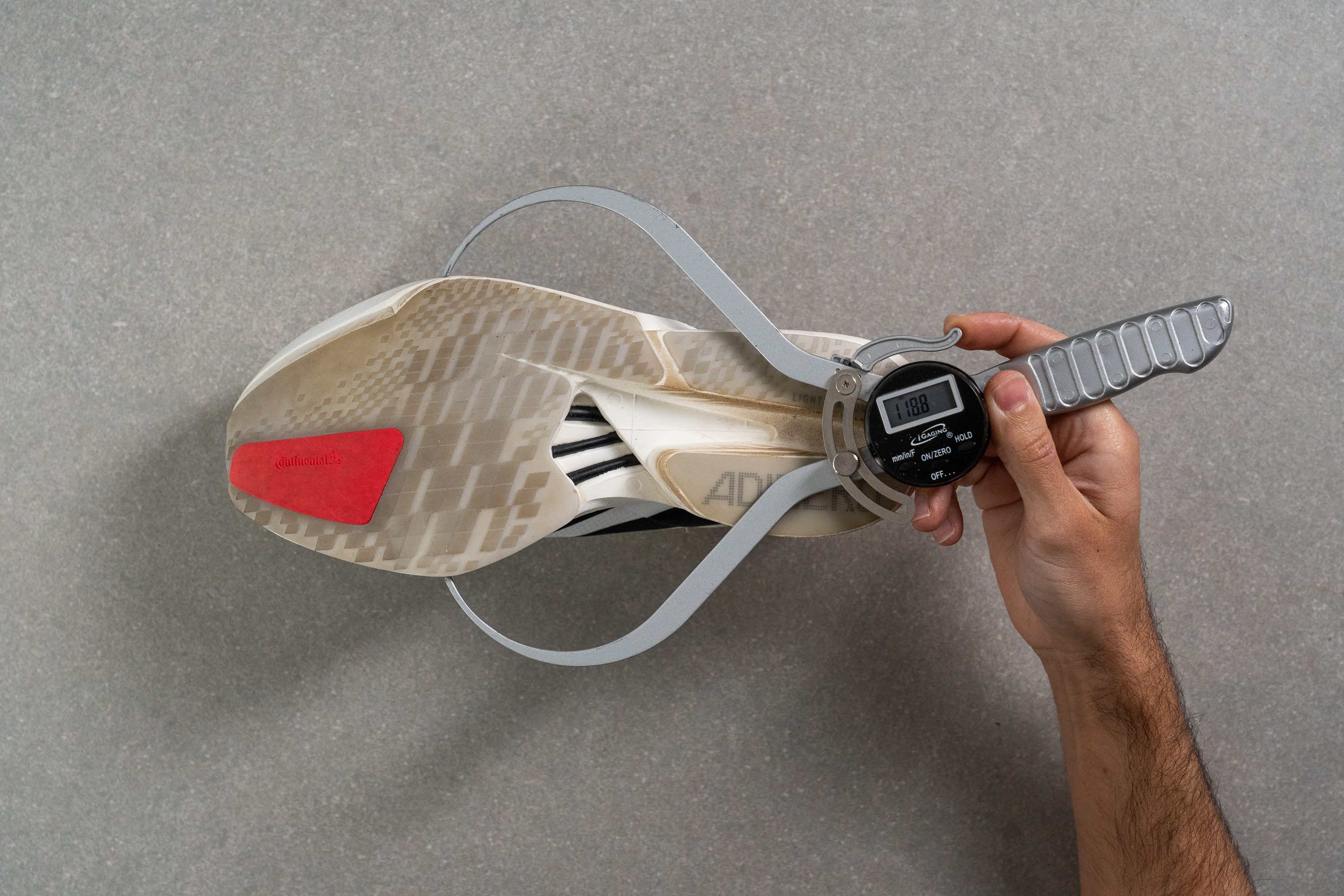
| Adizero Adios Pro 4 | 118.8 mm |
| Media | 114.4 mm |
Anchura de la mediasuela - talón
El talón de las Adios Pro 4 adopta un enfoque totalmente diferente. Con solo 80,4 mm, es 3,6 mm más estrecho que el de las Adios Pro 3, que ya era estrecho de por sí. En nuestra experiencia, este diseño ultrafino ofrece una estabilidad mínima y, si a esto le sumamos el recorte del mediopié, la transición al antepié resulta menos fluida para los corredores que aterrizan utilizando la parte de atrás de las zapatillas.
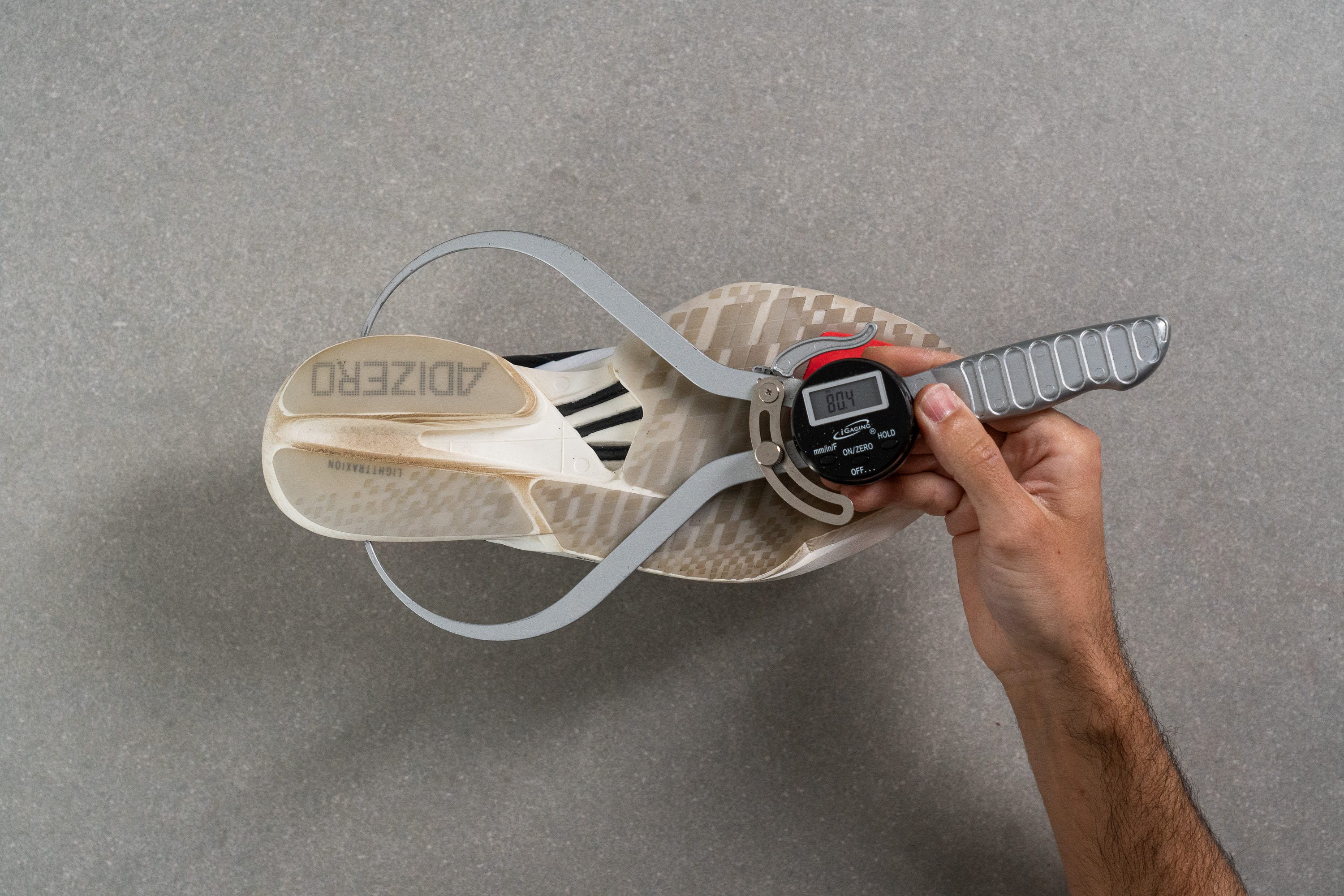
| Adizero Adios Pro 4 | 80.4 mm |
| Media | 90.6 mm |
Durabilidad
Durabilidad de la parte delantera
El upper también se queda corto en durabilidad, ya que se llevó la puntuación más baja de nuestro laboratorio: un desalentador 1/5. Sin embargo, esto es típico de las superzapatillas, donde la ligereza está antes que la longevidad en la escala de prioridades; y las AP4 destacan por ofrecer un diseño ligero como una pluma.
| Adizero Adios Pro 4 | 1 |
| Media | 2.6 |
Durabilidad del acolchado del talón
Por el contrario, el acolchado del talón consiguió destacar en nuestra segunda prueba Dremel, llevándose un impresionante 5/5. Este resultado es típico de las zapatillas de competición, ya que tener menos acolchado suele mejorar la durabilidad en esta zona.
| Adizero Adios Pro 4 | 5 |
| Media | 3.4 |
Dureza de la suela
Una de las características más destacadas de la serie Adios Pro ha sido siempre su suela exterior Continental, que ofrece mucho agarre y durabilidad. Sin embargo, en el esfuerzo de Adidas por reducir el peso, este elemento clave ha sufrido una transformación importante.

La suela exterior tiene una pequeña sección de Continental en el antepié, pero el resto es LIGHTTRAXION. Cuando lo analizamos, nuestro durómetro marcó 41,0 HC, así que es blandísimo y, además, ofrece un agarre excepcional.
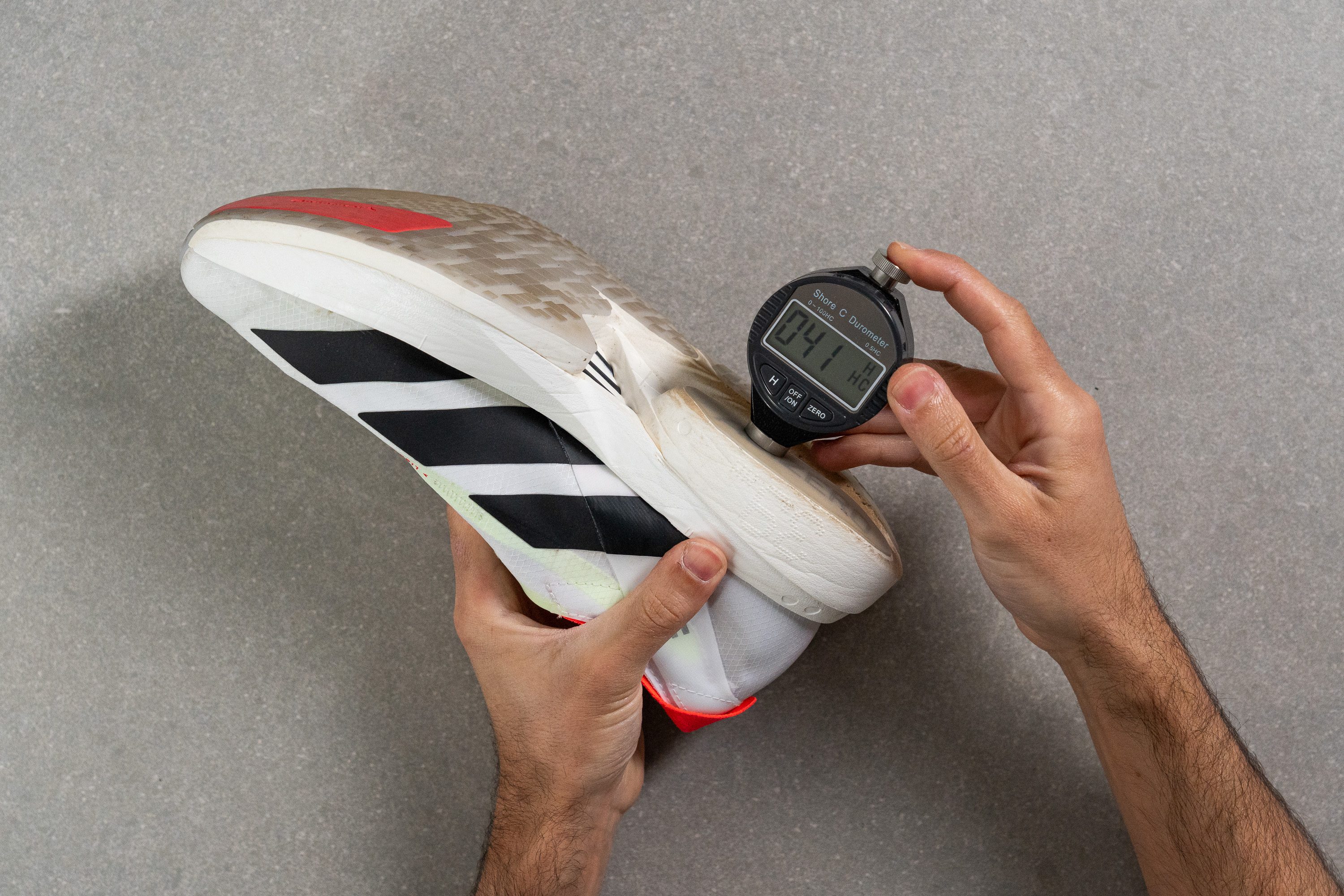
| Adizero Adios Pro 4 | 41.0 HC |
| Media | 79.2 HC |
Durabilidad de la suela
Una de las cualidades más destacadas del caucho Continental es su durabilidad, superando a menudo a casi cualquier otro caucho para el asfalto. Pero cuando sometimos al nuevo material LIGHTTRAXION a nuestra prueba Dremel, su rendimiento nos dejó boquiabiertos, ya que los daños fueron de solo 0,8 mm, que es un resultado excepcional para un compuesto tan blando.
| Adizero Adios Pro 4 | 0.8 mm |
| Media | 1.1 mm |
Grosor de la suela
En cuanto al grosor de la suela exterior, Adidas superó los límites con una capa minimalista de 1,0 mm, así que es 0,4 mm más fina que la de las Adios Pro 3. Durante nuestras pruebas de uso, también comprobamos que este caucho ultrafino hace que sientas las zapatillas más suaves bajo los pies en comparación con otros compuestos más firmes que, muchas veces, hacen que la mediasuela no se sienta tan mullida.
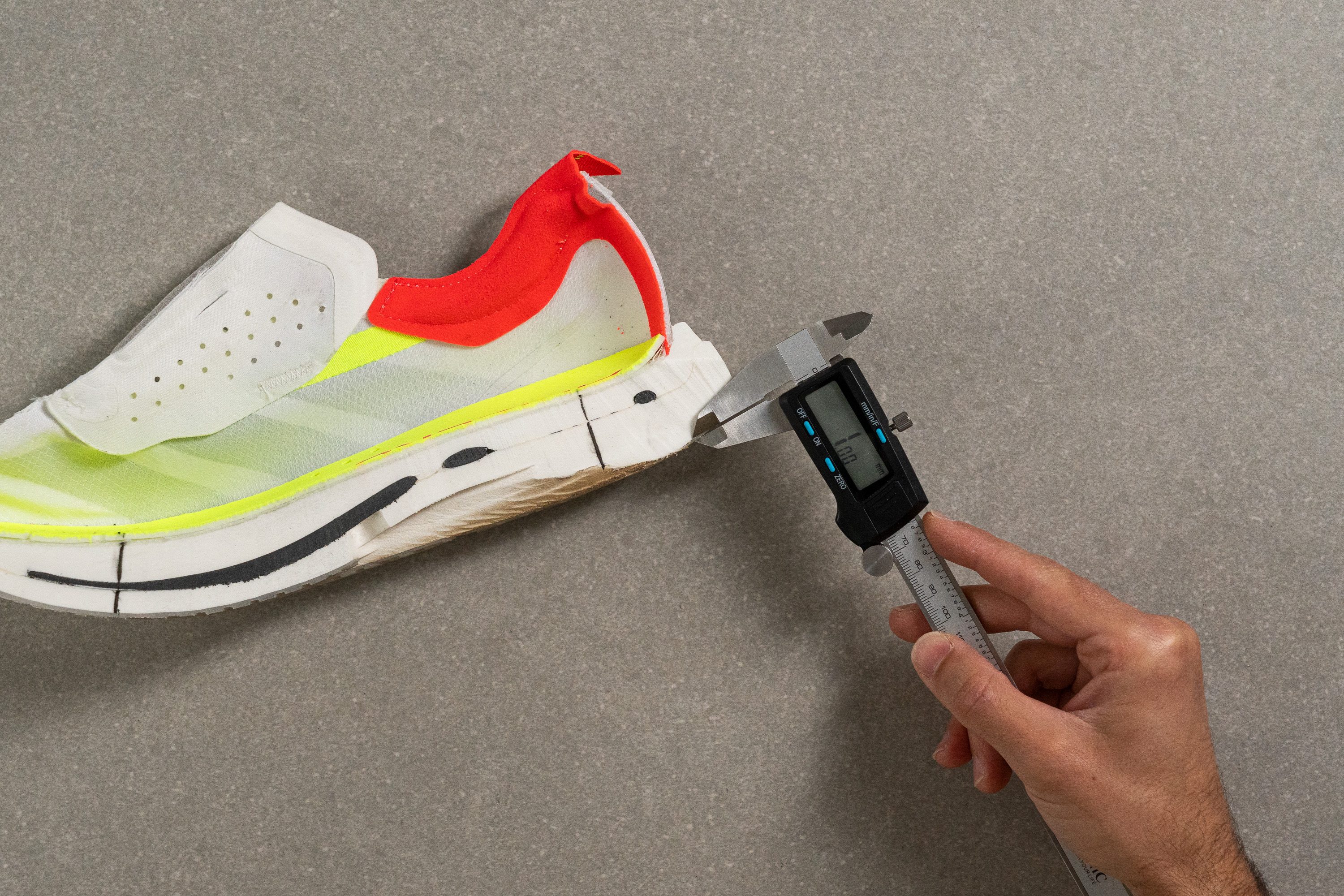
| Adizero Adios Pro 4 | 1.0 mm |
| Media | 3.2 mm |
Continental
Como hemos mencionado antes, hay un pequeño trozo de caucho Continental en el antepié, y Adidas ha querido maximizar su potencial. La estrategia fue colocar un parche con mucho agarre precisamente donde los corredores más lo necesitan, en el antepié, para una tracción óptima durante los aterrizajes y despegues.
La pieza de caucho Continental es relativamente pequeña y superó los 65 HC cuando la analizamos con nuestro durómetro. Aunque es difícil medir su impacto exacto en el agarre al correr, creemos que es probable que tenga un doble propósito: mejorar la tracción y mantener la reconocible marca Continental.
Tampoco sabemos si estamos ante un experimento que hará que las Adios Pro 5 ya no tengan nada de nada pero, por ahora, creemos que es un buen movimiento si ayuda a reducir el peso de las zapatillas.
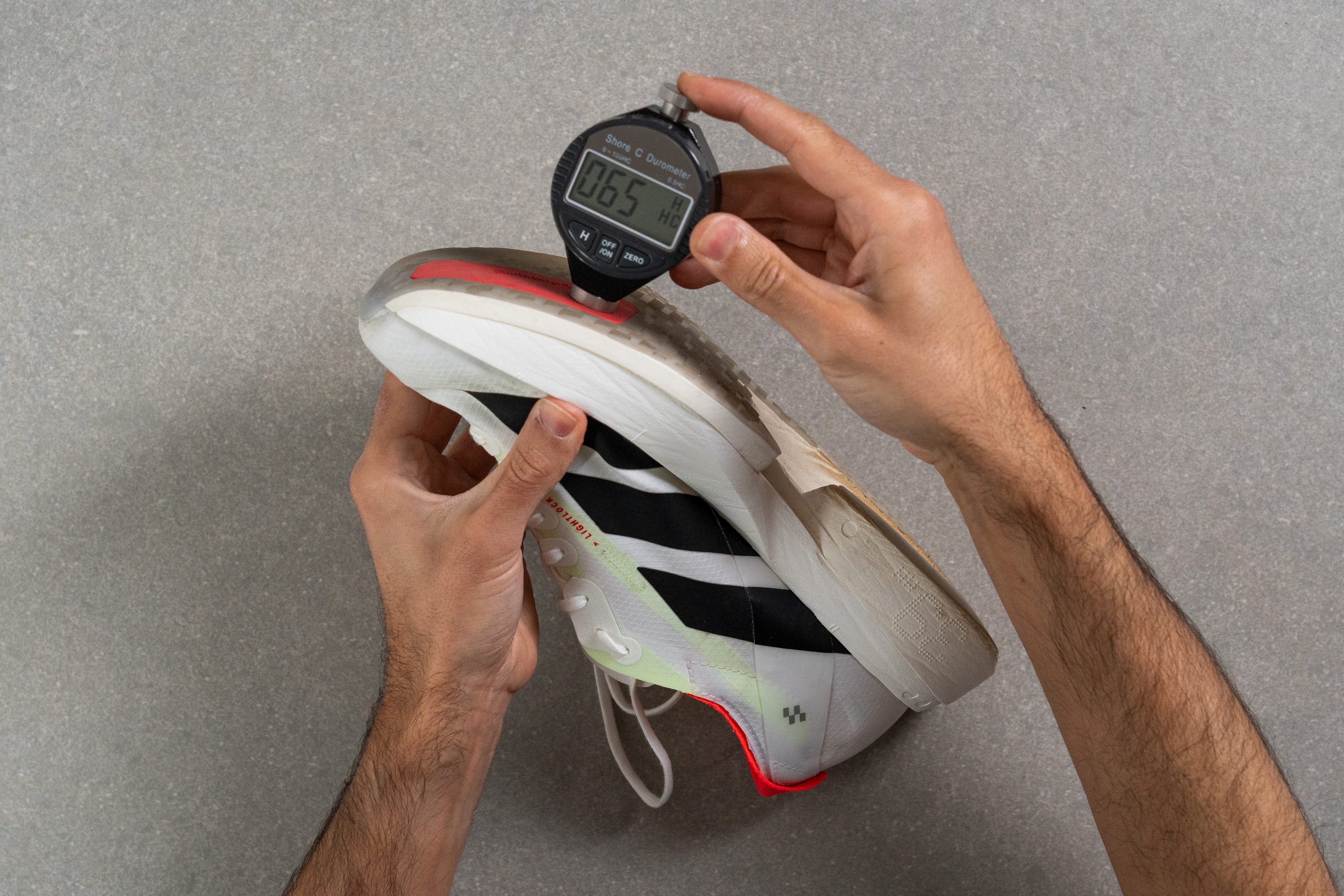
LIGHTTRAXION
El caucho Continental ha sido sustituido casi totalmente por el nuevo compuesto LIGHTTRAXION, que está diseñado para ofrecer una innovadora mezcla de ligereza, agarre y durabilidad. En nuestra opinión, este material crecerá en el mercado en los próximos 2-3 años.
A diferencia del caucho estándar que se encuentra en el 99 % de las zapatillas de running, el LIGHTTRAXION está fabricado con poliuretano. Este material traslúcido tiene varios puntos fuertes, como una mayor ligereza y durabilidad. Sin embargo, es más duro y caro de producir, además de que tiene un mayor impacto medioambiental. Por esto mismo creemos que tiene sentido utilizarlo en las zapatillas de running de primera calidad que se fabrican en pequeñas cantidades.
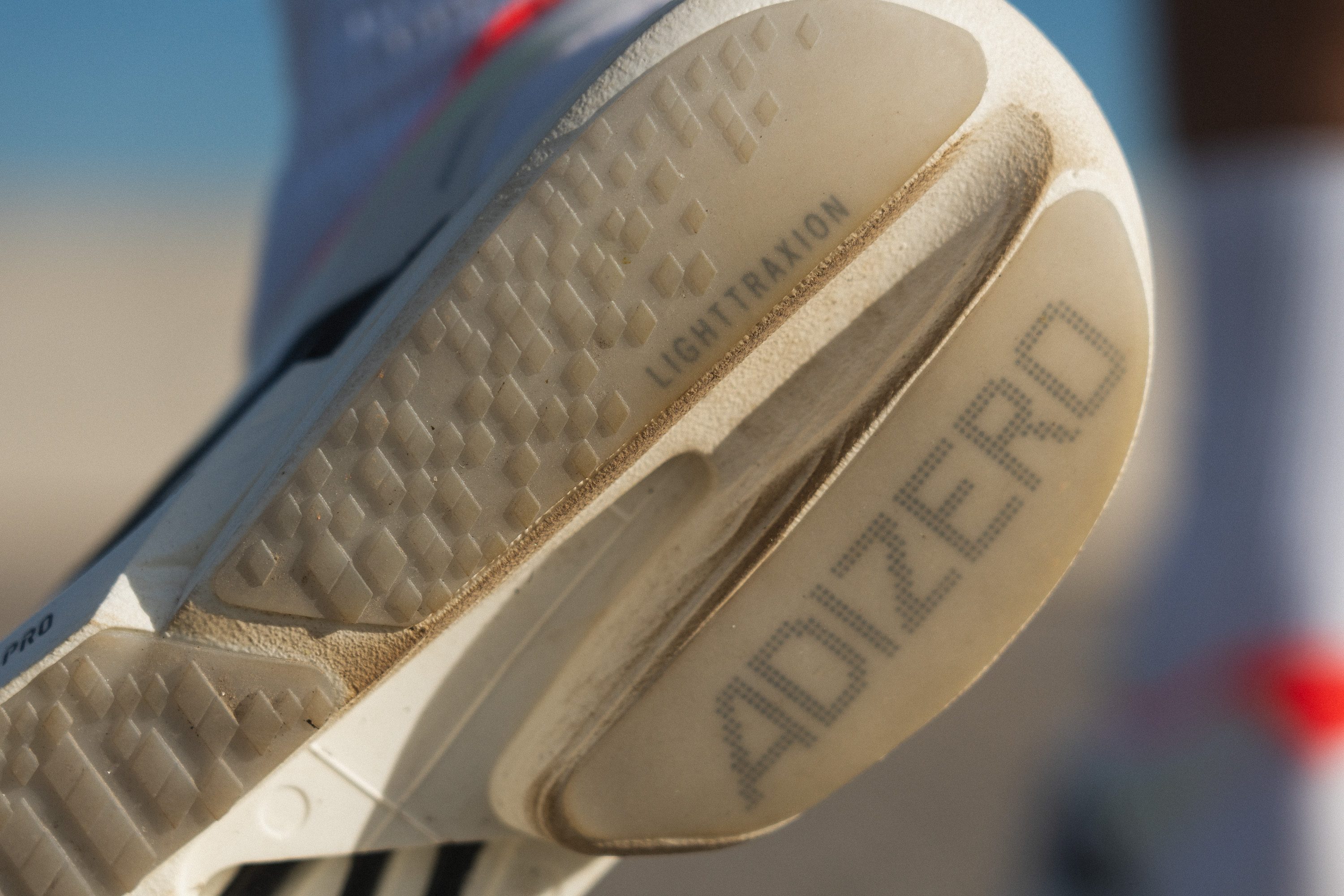
Varios
Grosor de la plantilla
La plantilla está llena de esas vibras de modelo de competición porque es finísima, alcanzando solo 1,9 mm. Este diseño hace que Adidas pueda maximizar la espuma, manteniendo la altura de la suela por debajo de los 40 mm.
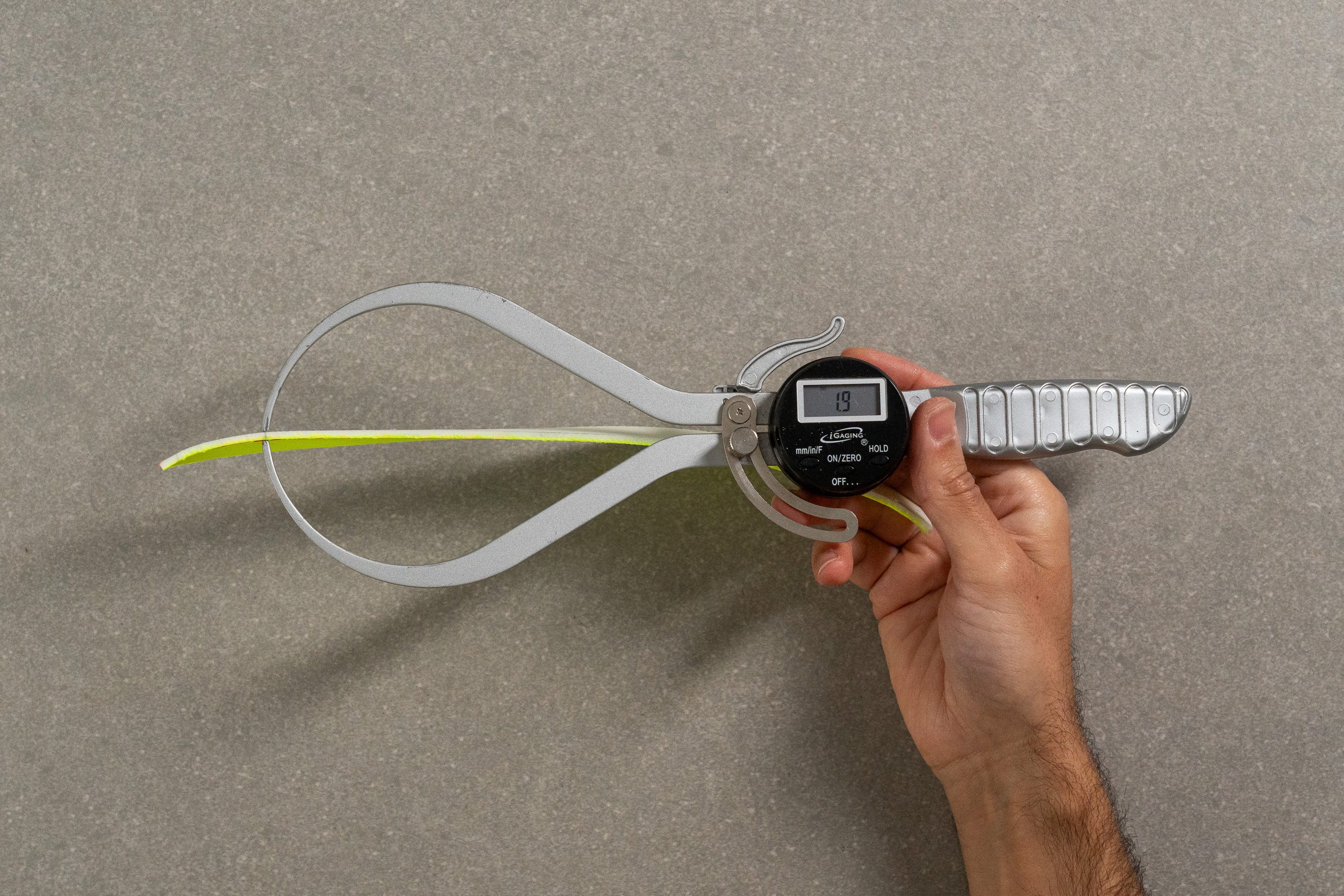
| Adizero Adios Pro 4 | 1.9 mm |
| Media | 4.5 mm |
Plantilla extraíble
Esta plantilla tan finita es extraíble, pero como la parte delantera de las Adios Pro 4 es tan estrecha, cambiarla por otra puede no ser la mejor opción. Además, también perderías un poco de transpirabilidad, ya que la plantilla que traen estas zapatillas tiene perforaciones.
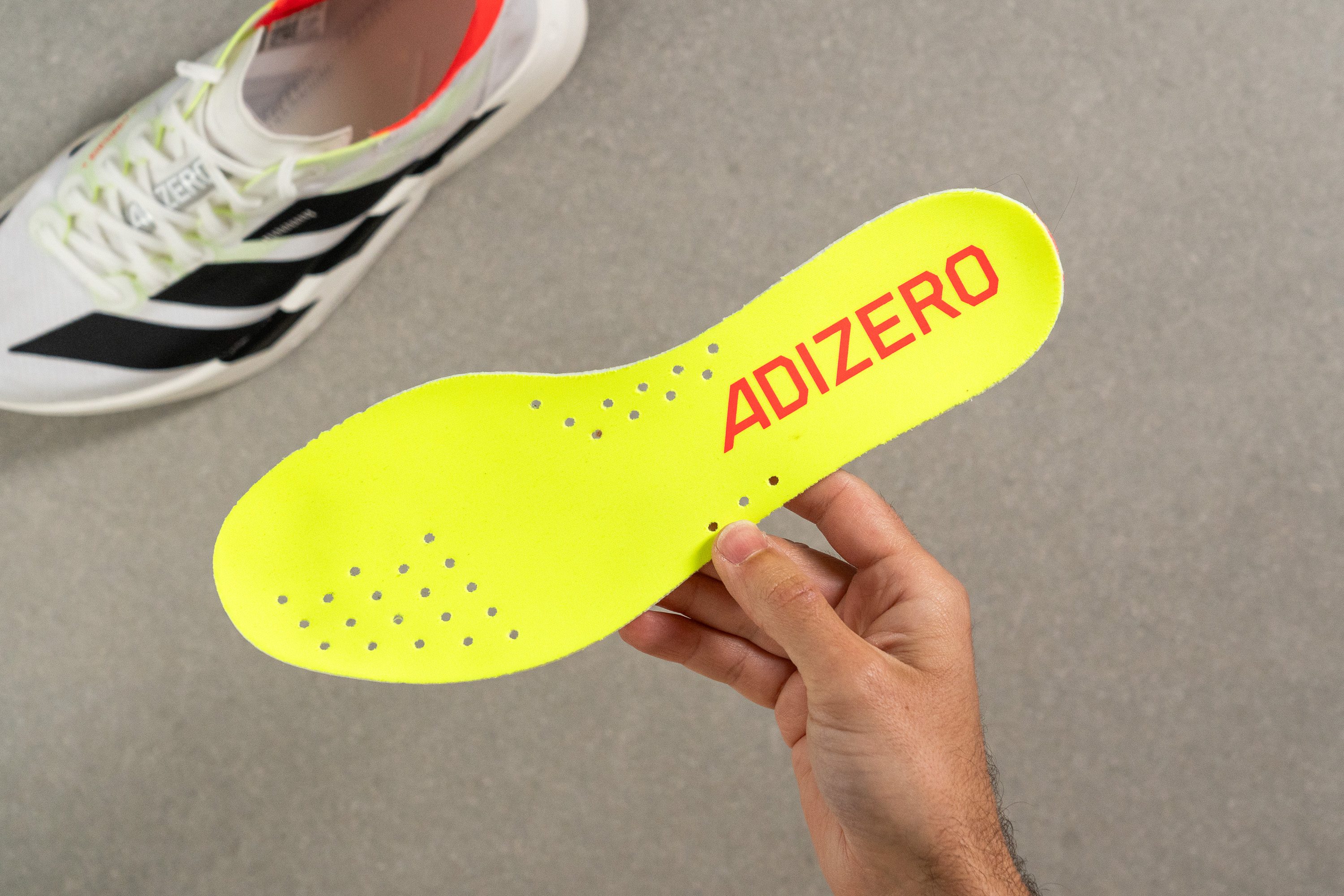
| Adizero Adios Pro 4 | Sí |
Rigidez de la mediasuela en frío (%)
Como la mediasuela está fabricada totalmente con TPEE y no hay ni rastro de espuma EVA, nos esperábamos un rendimiento expectacular en nuestra prueba de congelación. Y así fue, ya que tras 20 minutos al frío, volvimos a analizar las AP4 con nuestro durómetro y vimos que el cambio había sido de solo el 7 % en su rigidez.
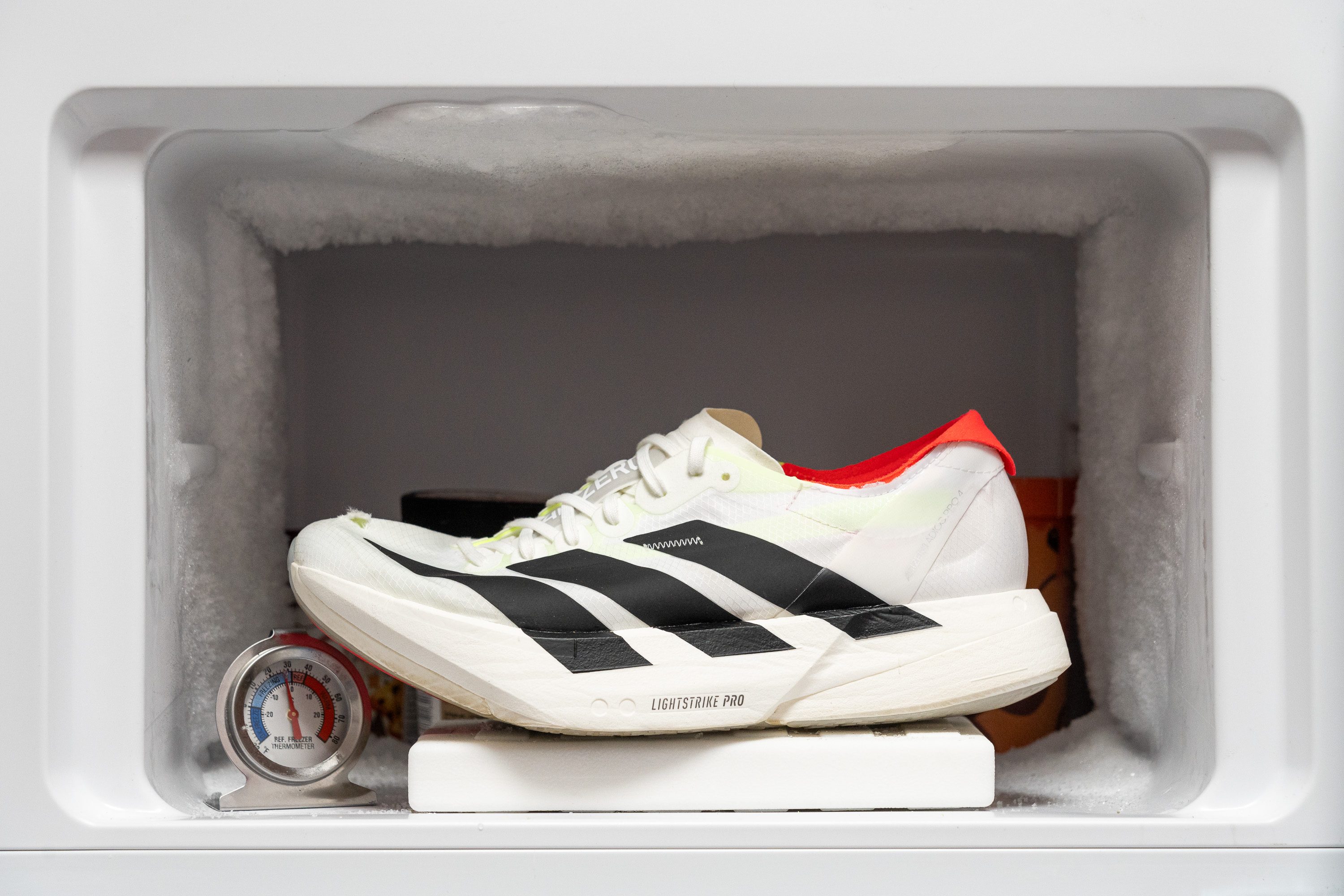
| Adizero Adios Pro 4 | 7% |
| Media | 24% |
Elementos reflectantes
Estas superzapatillas no tienen elementos reflectantes y, la verdad, nos parece estupendo, ya que no es una prioridad en absoluto.
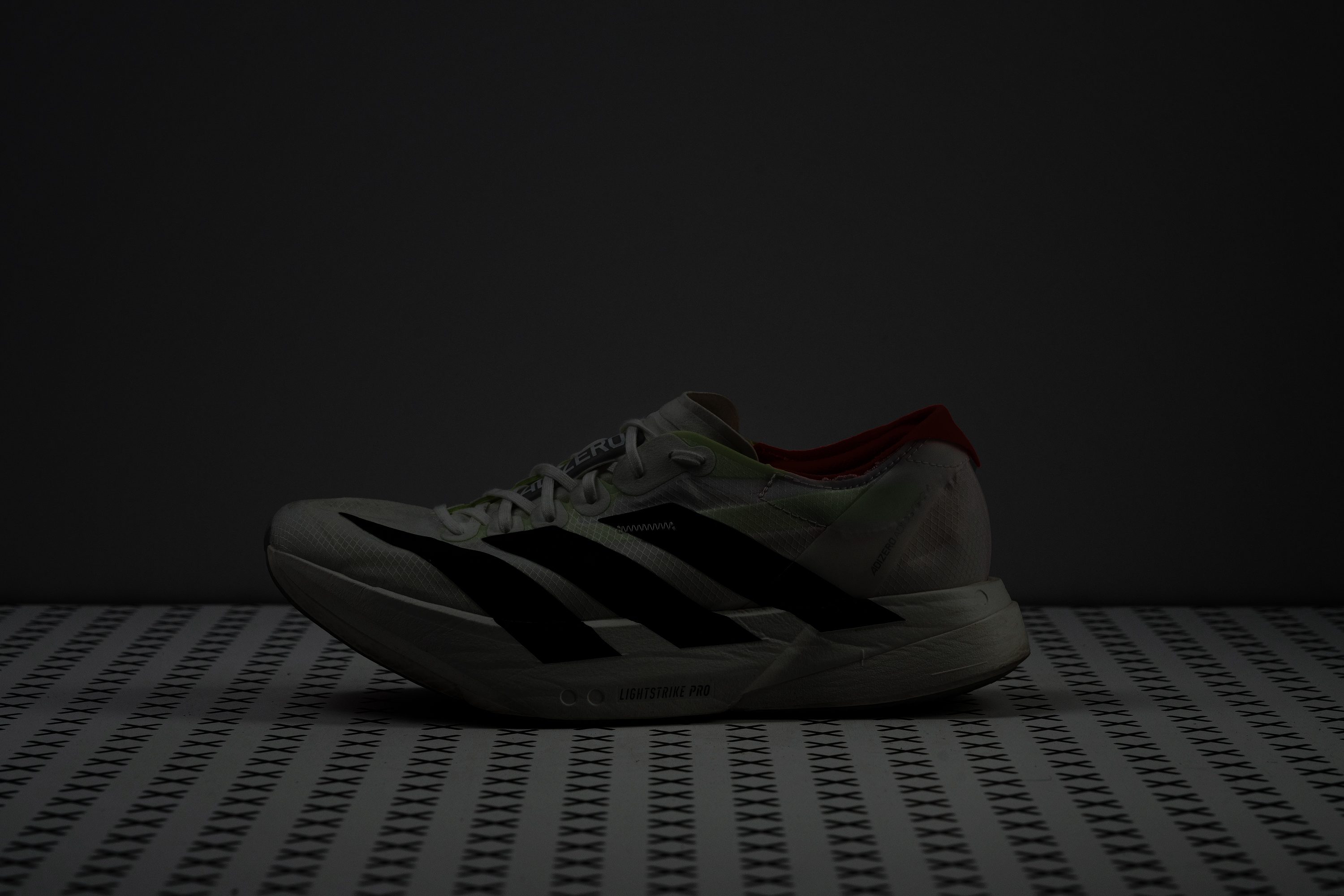
| Adizero Adios Pro 4 | No |
Acolchado de la lengüeta
Esta lengüeta es excelente para unas superzapatillas, ¡no hay más! Adidas ha sacrificado un poco la ligereza para incluir una plancha de espuma de 5,6 mm que ofrece un nivel de comodidad más parecido al de unas zapatillas de entrenamiento diario que al de unas superzapatillas. Esto hace que sean ideales para correr distancias tipo maratón, y la verdad es que es un cambio de diseño importante con respecto a las Adios Pro 3, que contaban con una de las lengüetas más finas de la historia, de solo 0,9 mm.
Esta mejora hace que las Adios Pro 4 se vuelvan unas de las mejores superzapatillas (por no decir las mejores) para los corredores que suelen experimentar molestias en el empeine, un problema frecuente cuando se corren maratones enteros.
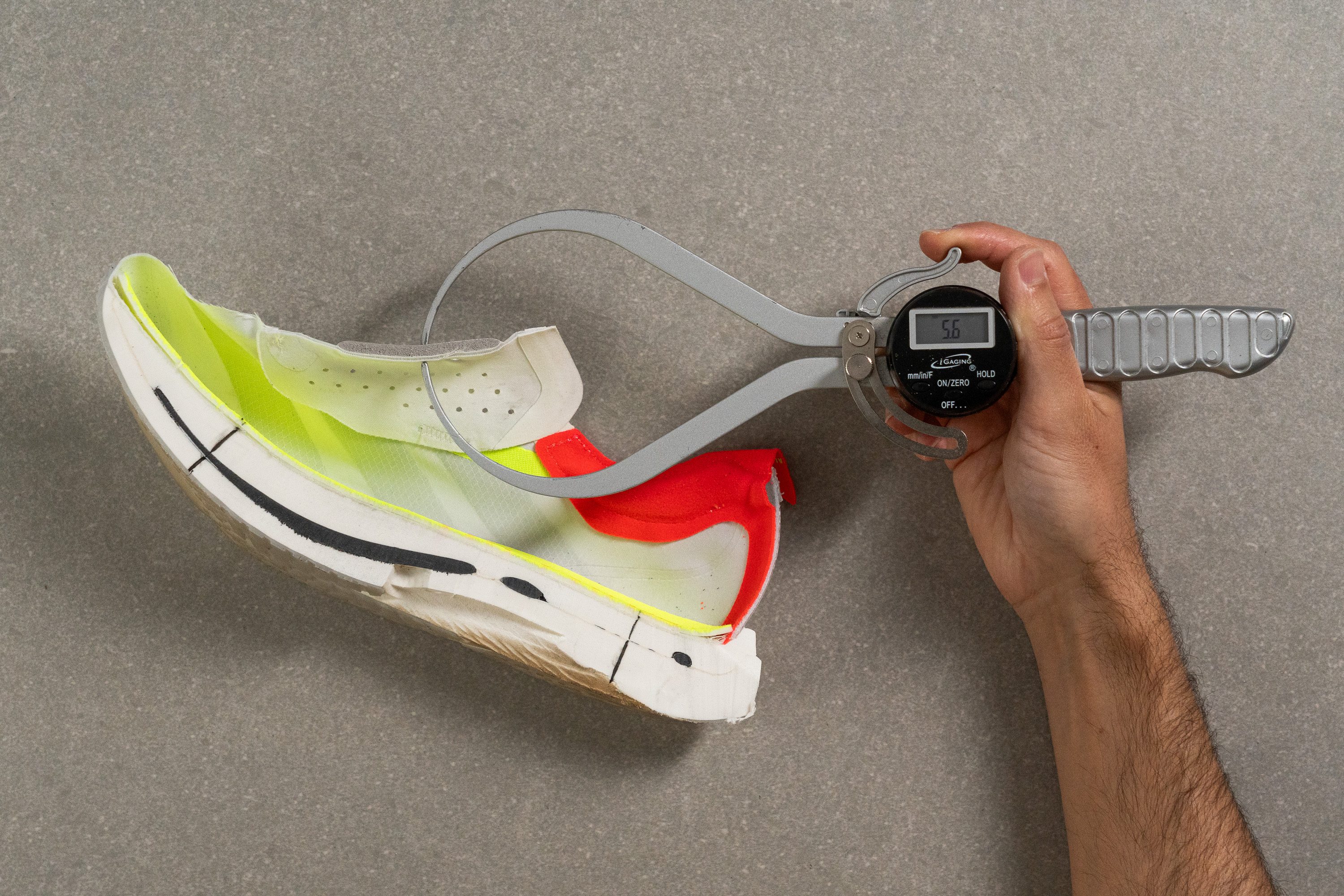
| Adizero Adios Pro 4 | 5.6 mm |
| Media | 5.7 mm |
Lengüeta: tipo de refuerzo
Una de las grandes preguntas que circulaban por Internet sobre las Adios Pro 4 era la finalidad de las costuras de los laterales de su upper.
Sospechábamos que estaban relacionadas con la lengüeta y, después de hacerles pruebas a estas zapatillas, descubrimos que habíamos acertado. La costura consigue que la lengüeta esté sujeta al upper y no a la mediasuela, un método poco común pero inteligente que mantiene la lengüeta en su sitio al tiempo que reduce el peso.
| Adizero Adios Pro 4 | Ambos lados (semi) |
Tirador del talón
El icónico tirador de las zapatillas Adizero sigue aquí, ahora con una cita que dice: "This too shall pass", que traducido sería: "Esto también pasará", ¡un detalle muy chulo y motivador!
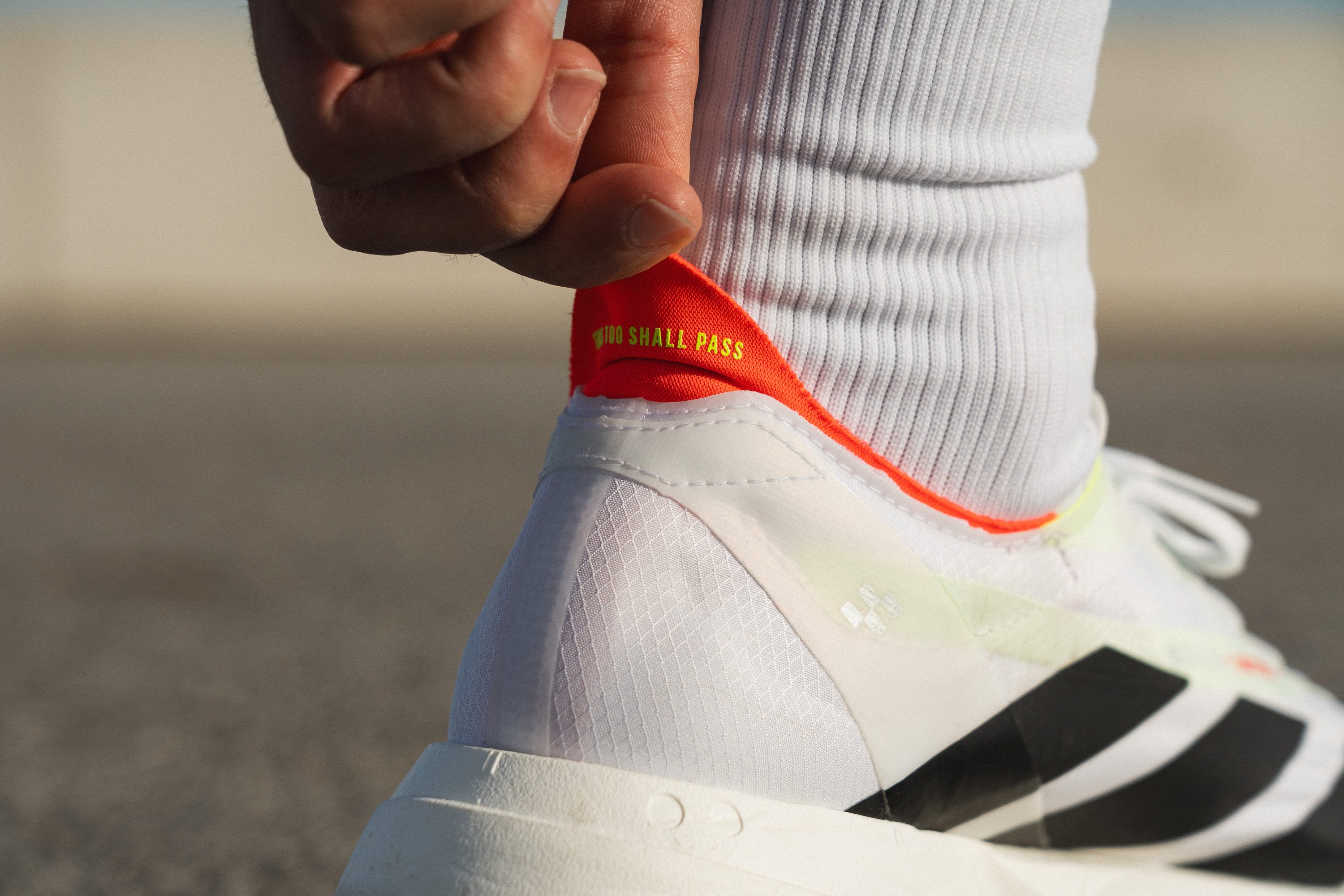
| Adizero Adios Pro 4 | Tirador estándar |
Precio
No nos esperábamos que las Adios Pro 4 cambiasen de precio. Que fuesen más caras haría que perdiesen puntos frente a sus competidoras, y al ser un modelo de rendimiento, tampoco era probable que fuese a costar menos. Por lo tanto, que cuesten lo mismo que sus predecesoras, las Adios Pro 3, no es algo que nos haya pillado por sorpresa.
| Adizero Adios Pro 4 | $250 |
Sistema de cordones
Las Adios Pro 3 se enfrentaron a algunos problemillas que persisten durante toda su vida útil, como lo frágiles que son sus dos primeros ojales, que es algo que frustró a un montón de corredores.
Por suerte, Adidas los ha cambiado. Sabíamos que esto iba a pasar, ya que se veía en las imágenes filtradas de un prototipo de las Adios Pro 4 en diciembre de 2023, aunque también es cierto que esa versión nunca llegó a lanzarse. Las Adios Pro 4 actuales, que ya están disponibles, adoptan el diseño de los ojales de las EVO 1, resolviendo así este problema.
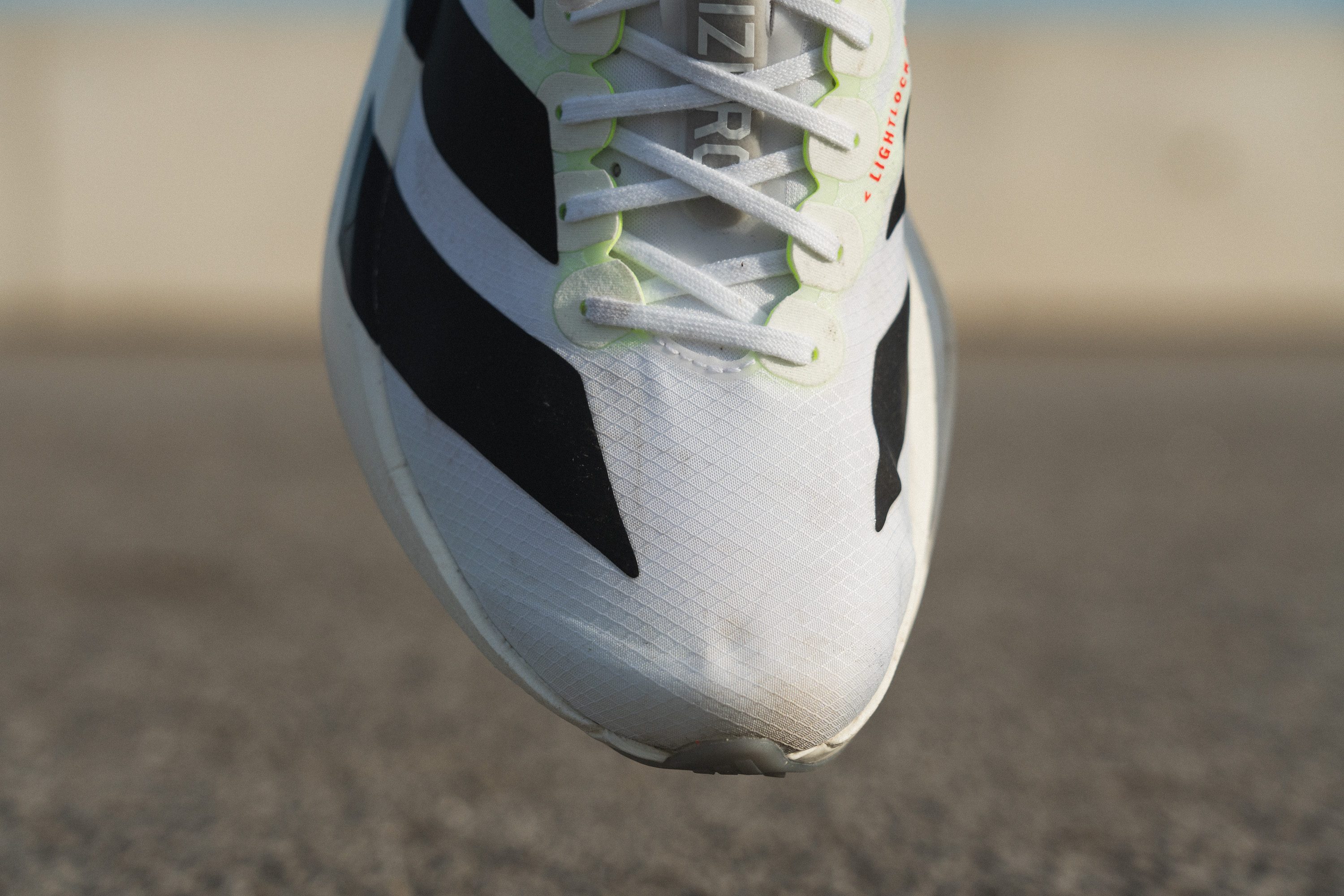
Los cordones planos y finos no se han ido a ningún lado, y proporcionan un ajuste seguro sin desatarse. Pero, sinceramente, nosotros nos volvemos a llevar las manos a la cabeza porque unas Adizero con este precio no tienen cordones de primera calidad, ¡y eso que Nike y ASICS los llevan incluyendo años y años en sus superzapatillas!
